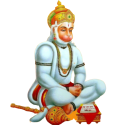Online Yoga Classes
-
Overview
-
Course and Retreat Curriculum
-
Class
-
Counselling
-
Class Fee
-
Schedule
-
How to Register
-
Course & Retreat Date and Fee
The Online Yoga programs include Online Yoga Teacher Training Courses, Online Yoga Retreats and Online Yoga Classes of different nature. All sessions in each online Yoga teacher training course are combined with LIVE ONLINE CLASSES, SELF-STUDY, ASSIGNMENTS and RECORDED VIDEOS etc. according to the concerned program. We have had great success from the last year 2015 when a lot of people from Scandinavian countries and Europe have been reached.
Medium of service – Via SKYPE, ZOOM and other available online mediums such as Facebook, Google etc. whichever works apt at the time.
Eligibility – Online Yoga eligibility –
- For Fundamental YTTC, anyone can join. If the participants have some basic understanding of Yoga classes, then they can receive the knowledge easily.
- For Advance YTTC, the participants should be sincere Yoga practitioners, spiritual minded people and practising teachers of Yoga.
- For Fundamental Retreat, anyone can join.
- For Advance Retreat, the participants should be sincere Yoga practitioners, spiritual minded people and practising teachers of Yoga.
- The participants must have proper access to internet and useful devices which help them follow the program conveniently.
Lists and Nature of Online Programs of Yoga
 Fundamental Yoga Teacher Training Course –
Fundamental Yoga Teacher Training Course –
- 200 Hatha Yoga Teacher Training Course (21 Days – 3 Weeks) – For all
- 300 Hatha Yoga Teacher Training Course (28 Days – 4 Weeks) – For all
- 500 Hatha Yoga Teacher Training Course (49 Days – 7 Weeks) – For all
Advance Yoga Teacher Training Course –
- 300 Kriya Yoga Teacher Training Course (28 Days – 4 Weeks) – For experienced Yoga practitioners, spiritual minded people and practising teachers of Yoga.
- 300 Kundalini Yoga Teacher Training Course (28 Days – 4 Weeks) – For experienced Yoga practitioners, spiritual minded people and practising teachers of Yoga.
- 300 Raja Yoga Teacher Training Course (28 Days – 4 Weeks) – For experienced Yoga practitioners, spiritual minded people and practising teachers of Yoga.
- 300 Bhakti Yoga Teacher Training Course (28 Days – 4 Weeks) – For experienced Yoga practitioners, spiritual minded people and practising teachers of Yoga.
Fundamental Retreat –
- Yoga Retreat (10 Days) – For all
- Meditation Retreat (7 Days – 1 Week) – For all

Advance Retreat –
- Women Yoga Training Retreat (10 Days) – For experienced Yoga practitioners and practising teachers of Yoga.
- Children Yoga Training Retreat (10 Days) – For experienced Yoga practitioners and practising teachers of Yoga.
- Yoga Therapy Training Retreat (21 Days – 3 Weeks) – For all
 Daily (drop-in) Yoga Class – For all
Daily (drop-in) Yoga Class – For all
15 Hours Hatha Asana Training with Certification – For experienced Yoga practitioners, spiritual minded people and practising teachers of Yoga.
15 Hours Kundalini Asana Training with Certification – For experienced Yoga practitioners, spiritual minded people and practising teachers of Yoga.
15 Hours Pranayama Training with Certification – For experienced Yoga practitioners, spiritual minded people and practising teachers of Yoga.
15 Hours Yoga Nidra Training with Certification – For all
15 Hours Prana Vidya Training with Certification – For experienced Yoga practitioners, spiritual minded people and practising teachers of Yoga.
 15 Hours Chakra Training with Certification – For experienced Yoga practitioners, spiritual minded people and practising teachers of Yoga.
15 Hours Chakra Training with Certification – For experienced Yoga practitioners, spiritual minded people and practising teachers of Yoga.
Special Yoga Class – For all
Yoga Workshop – For all
Yoga Therapy – For those who require
Yoga Counselling – For those who require
General duration of Online Yoga Class – 1, 2, 3, 4, 5, 6, 7, 8, 9, 10, 11, 12……days onwards.
How does the Online Yoga program work –
- The classes are arranged according to the individual course/retreat/classes/counselling.

- The link for the concerned session for the complete duration with timings is shared to the participants before.
- Rohit Kumar himself and/or other assistant teachers are available at the scheduled time for the class.
- Please be ready with your electronic devices active and aptly placed.
- As soon as the exact time arrives the teacher begins the Live Online Yoga session.
- There are sufficient space for raising wise questions and proper interactions.
- We will be grateful for your patience in the event of any unexpected issue with internet and like.
General contents of Online Yoga – Practices from Hatha Yoga, Raja Yoga, Kriya Yoga, Kundalini Yoga, Meditation, Pranayama, Mudra, Bandha, Relaxation, Tantra for couples, Yoga Nidra and Reiki Sessions as well as Anatomy, Physiology, philosophy and so on.
 Accreditation – Sanatana Yog Sandesh is certified by Yoga Alliance USA and Yoga Alliance International which provide the chances to use the certificate for career and job opportunities. Upon successful completion of the course students are eligible to register with Yoga Alliance USA as Registered Yoga Teachers (E-RYT).
Accreditation – Sanatana Yog Sandesh is certified by Yoga Alliance USA and Yoga Alliance International which provide the chances to use the certificate for career and job opportunities. Upon successful completion of the course students are eligible to register with Yoga Alliance USA as Registered Yoga Teachers (E-RYT).
Yoga Teacher Training Course Curriculum
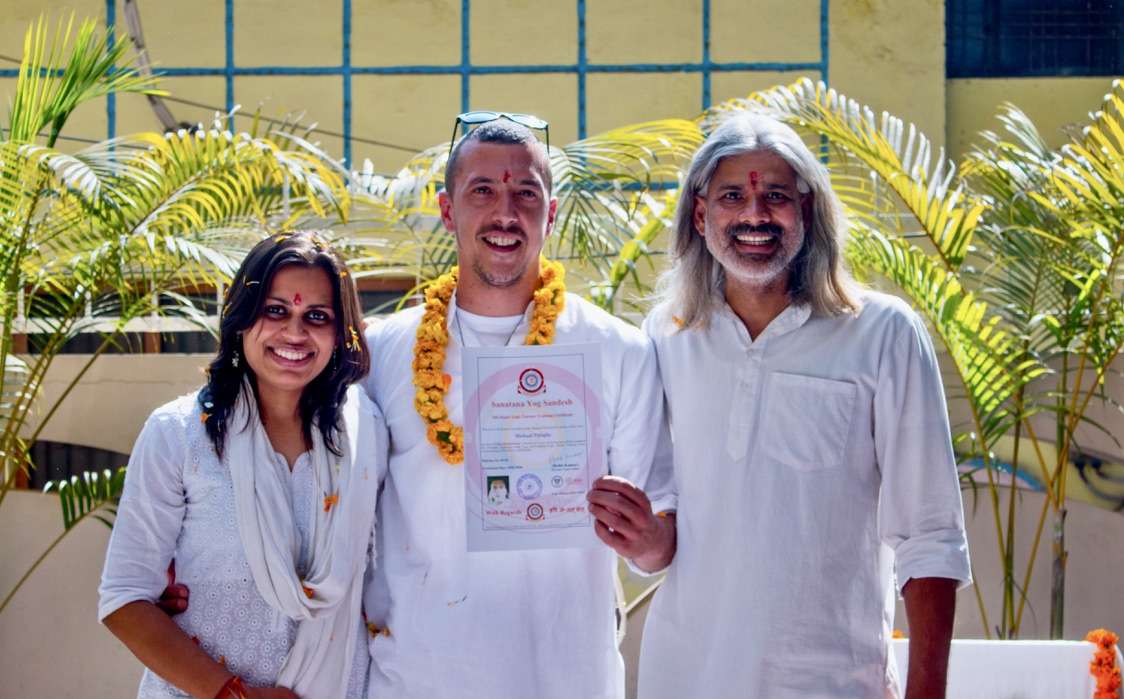 200 Hours Traditional Hatha Yoga Teacher Training Course in Rishikesh India with (up-levelled curriculum) incorporates a variety of topics. All these topics come under these following heads –
200 Hours Traditional Hatha Yoga Teacher Training Course in Rishikesh India with (up-levelled curriculum) incorporates a variety of topics. All these topics come under these following heads –
1. Techniques, Training and Practice – It incorporates various techniques of Hatha Yoga which students will study in the Yoga Teacher Training Course. They are –
Asana – Postures of Hatha Yoga such as preparatory movements of joints, muscles and parts of body, Standing, Supine, Prone – (backward, forward, spine twist), Inversion and Balance at intermediate level.
Pranayama – Udar Svashan, Vaksha Svashan, Griva Svashan, Yogic Svashan, Kapalabhati, Nadi Shodhana, Bhramari and Ujjayi.
Mudra – Gesture of hands, fingers and body to affect energy in body.
Bandha – Practices of locking the energy in body (Jalandhara Bandha).
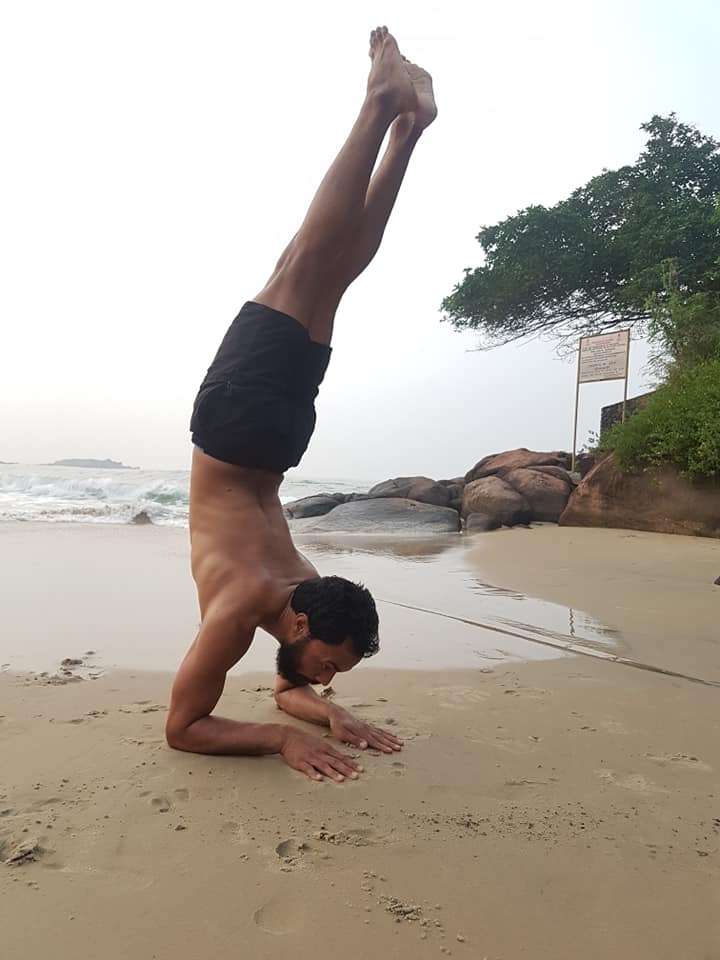 Satkarma – Practices for purification of body in Yoga (Jala Neti).
Satkarma – Practices for purification of body in Yoga (Jala Neti).
Meditation – Fundamental practices of Yoga Nidra, Yogic breathing with awareness, Fundamental practices of developing awareness, Kaya asthairyam (stillness of body), Awareness of natural breath, Awareness of peace, Antarmouna (inner silence) with awareness of natural sensory responses and awareness of natural thought process and Developing awareness with mantra such as AUM.
Chanting – Chanting and practice of important holy syllables for well-being and auspiciousness in life.
Singing Bowls – Practice of sound awareness and sound experience.
2. Anatomy and Physiology –
Anatomy – Skeleton system (major bones, types of joints, major muscles involved in asana and types of contraction).
Physiology – Nervous system including ‘fight, flight, freeze’ stress response, Vagal theory, Overall mind-body connection, Cardiovascular/Circulatory, Endocrine, Digestive systems as they relate to Yoga practice, Respiratory system including muscles that affect breathing, Involuntary vs. voluntary breath and how air enters and leaves the body.
Biomechanics – Types of joint movement, Joint stabilization, Safe movement as it pertains to balancing, stretching, awareness and physical limitations, Contraindications, Misalignments and adaptations.
Elective – Additional study on modern physio about bones, joints, muscles and their movements.
Additional topics – Shared anatomical and alignment principles plus contraindications, Effects of Pranayama on anatomy and subtle body, Complete sequencing of pranayama including alternatives and adaptations, Different types of Pranayama and Ayurveda tri-dosha basic knowledge.
3. Yoga Humanities –
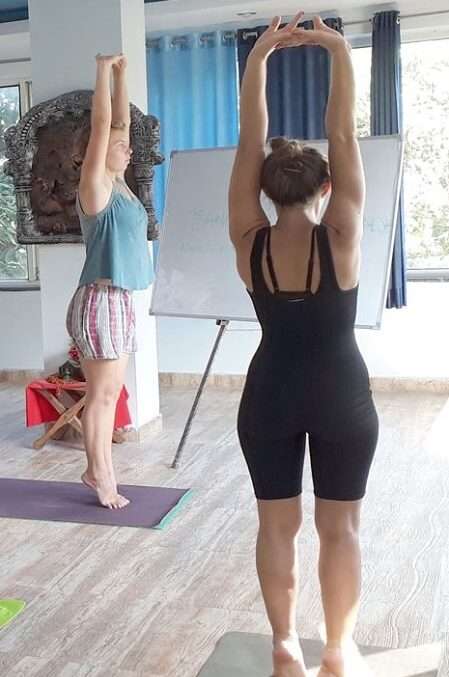 History – Yoga and its meaning, Historical perspective of Yoga, Yoga in ancient texts, School’s lineage, style and methodology, Important dates and key ideas – Vedic period, Pre-classical era, Classical era, Middle Ages, Hatha Yoga 11 Century, Colonial era, Modern revival – 19th century with Swami Vivekananda and other great saints and Yogis, Veda, Vedanta and Hatha, Historical context of Asana, specific Asana from the school’s lineage, Historical context of Pranayama, Meditation methods by lineage and Ability to practice school’s chosen meditation practice.
History – Yoga and its meaning, Historical perspective of Yoga, Yoga in ancient texts, School’s lineage, style and methodology, Important dates and key ideas – Vedic period, Pre-classical era, Classical era, Middle Ages, Hatha Yoga 11 Century, Colonial era, Modern revival – 19th century with Swami Vivekananda and other great saints and Yogis, Veda, Vedanta and Hatha, Historical context of Asana, specific Asana from the school’s lineage, Historical context of Pranayama, Meditation methods by lineage and Ability to practice school’s chosen meditation practice.
Philosophy – Definition of Yoga, philosophy and key terms, Tradition of Yoga, Important scriptures of Yoga, Important Darshan (schools of philosophy), Branches of Yoga (Gyana Yoga, Karma Yoga, Bhakti Yoga, Raja Yoga, Hatha Yoga, Swara Yoga, Kundalini Yoga, Kriya Yoga, Nada Yoga and Mantra Yoga), Brahman and Atman, Yuga (Age) and its characteristics, Individual existence (Sharira Traya, Pancha Tattva, Gyanendriya and Karmendriya, Antahkaran, Triguna, Pancha Kosha, Nadi, Prana Vayu, Chakra and Kundalini), Sad Bhava Vikar (Six modifications of body), Sadurmi (Six waves), Sadripu (Six enemies), Karma, Mrityu and Punarjanma (Death and reincarnation), Mukti, Important topics from Yoga Sutra of Patanjali (Introduction of the four chapters, Anushashan, Chitta, Vritti, Swarupa, AUM and Asta anga of Yoga), Key terms of meditation, Japa, Mantra, Mudra, Relationship between Asana, Pranayama and meditation with reference from Yoga sutra and according to school’s approach, Relationship, message and similarity between Yoga Sutra, Bhagavad Gita and Hatha Yoga Pradipika and Self-reflection on how philosophy relates to practice.
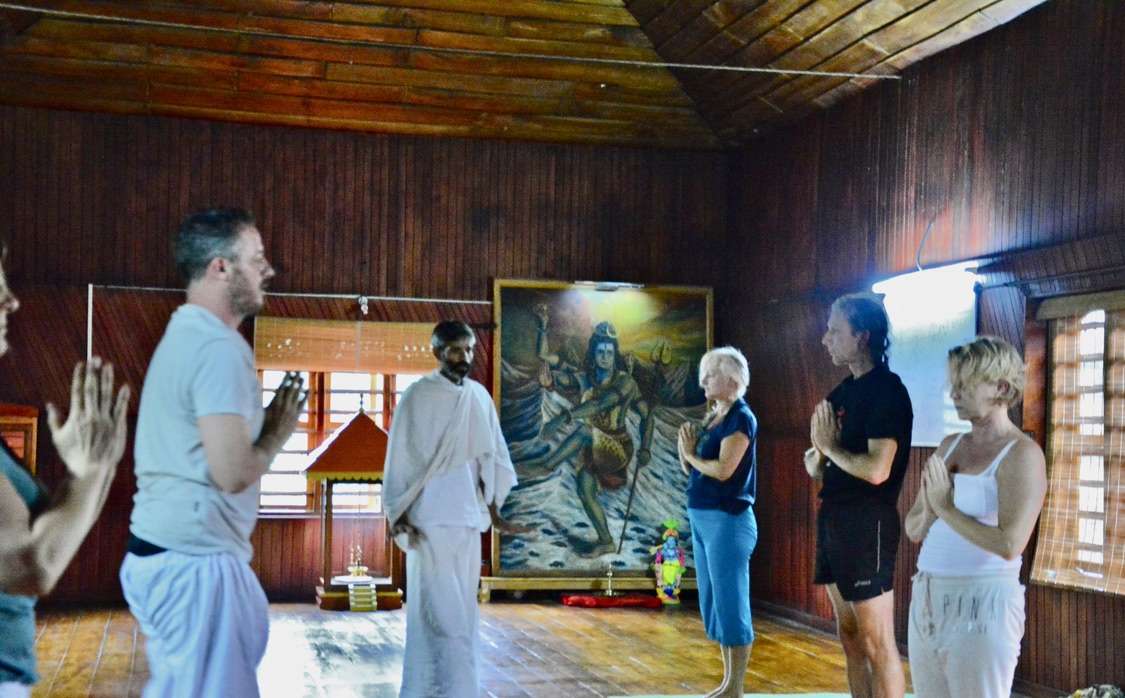 Ethics – Awareness of Yoga Sutras or similar Yogic ethical precepts, Relationship to Yoga Alliance’s ethical commitment, Comprehension of and responsibility to increase equity in Yoga, Accountability measures, Self-reflection on how Yoga ethics relate to practice and Teaching.
Ethics – Awareness of Yoga Sutras or similar Yogic ethical precepts, Relationship to Yoga Alliance’s ethical commitment, Comprehension of and responsibility to increase equity in Yoga, Accountability measures, Self-reflection on how Yoga ethics relate to practice and Teaching.
Elective – Aum definition, Aum sound and Inner sound awareness.
4. Professional Essentials –
Teaching Methodology – Sequencing, Pace, Environment, Cueing (verbal, visual, physical) and class management.
Professional Development – Yoga-related professional organizations including the Yoga Alliance credentialing process, Ethical commitment including scope of practice, Code of conduct and equity position statement, Lifetime of learning and continuing education, General professionalism including timeliness, consistency and cleanliness and liability insurance, waivers and invoicing.
Elective – Marketing tools, Online Yoga business, Websites, Promotion, Profession and Career.
Practicum – Knowledge, Skills, Experience across 12 key competencies, Mentorship component including apprenticeship and Feedback.
Additional topics – Complete sequencing (Asana, Pranayama and Meditation) to achieve particular effect.
Suggested Yoga Books for 200 Hours Traditional Hatha Yoga Teacher Training Course –
Asana Pranayama Mudra Bandha – Swami Satyananda Saraswati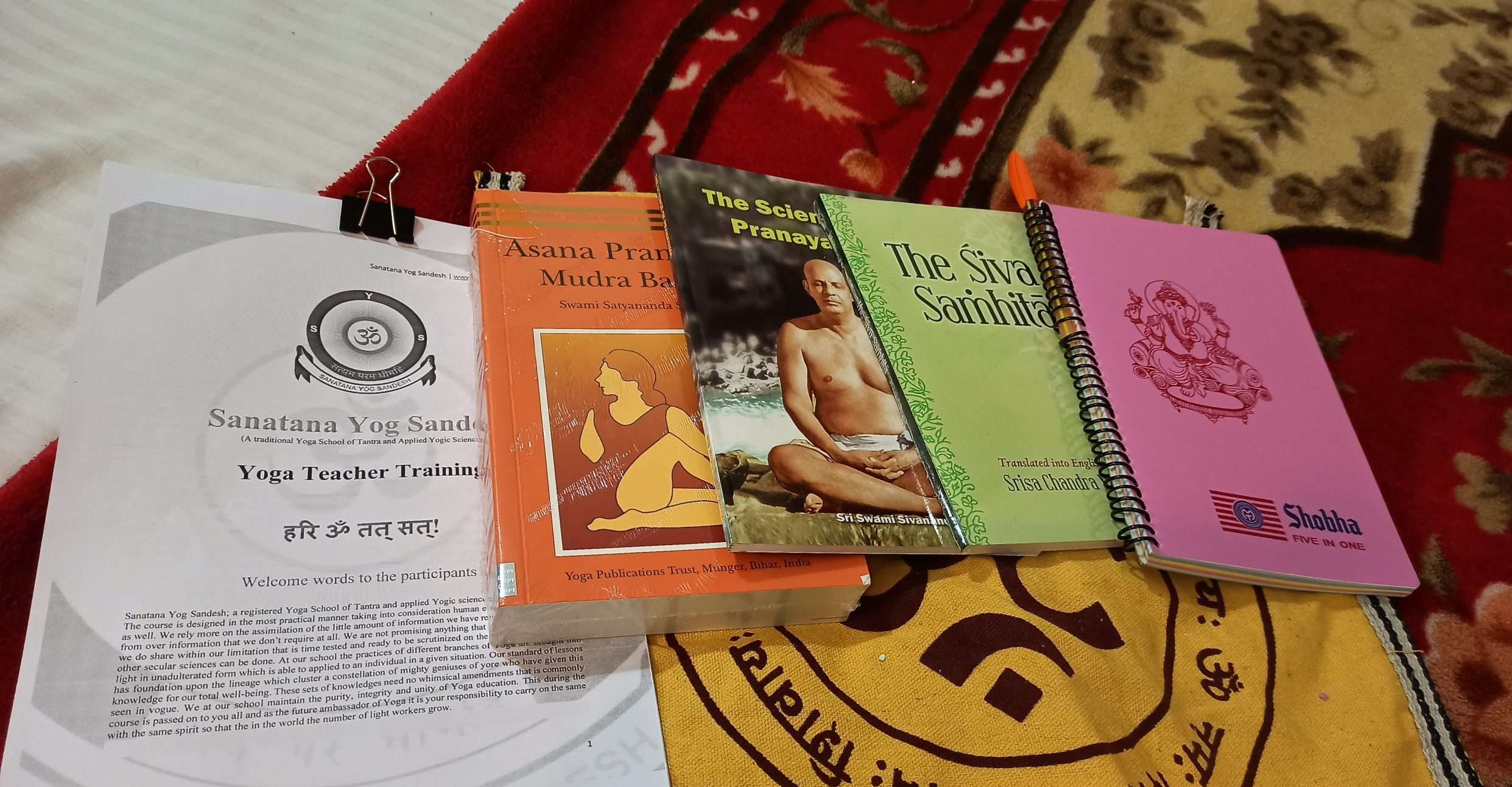
Raja Yoga – Swami Vivekananda or
Four Chapters on freedom – Swami Satyananda Saraswati
Yoga Darshan – Swami Niranjanananda Saraswati
Anatomy and Physiology – Not specified
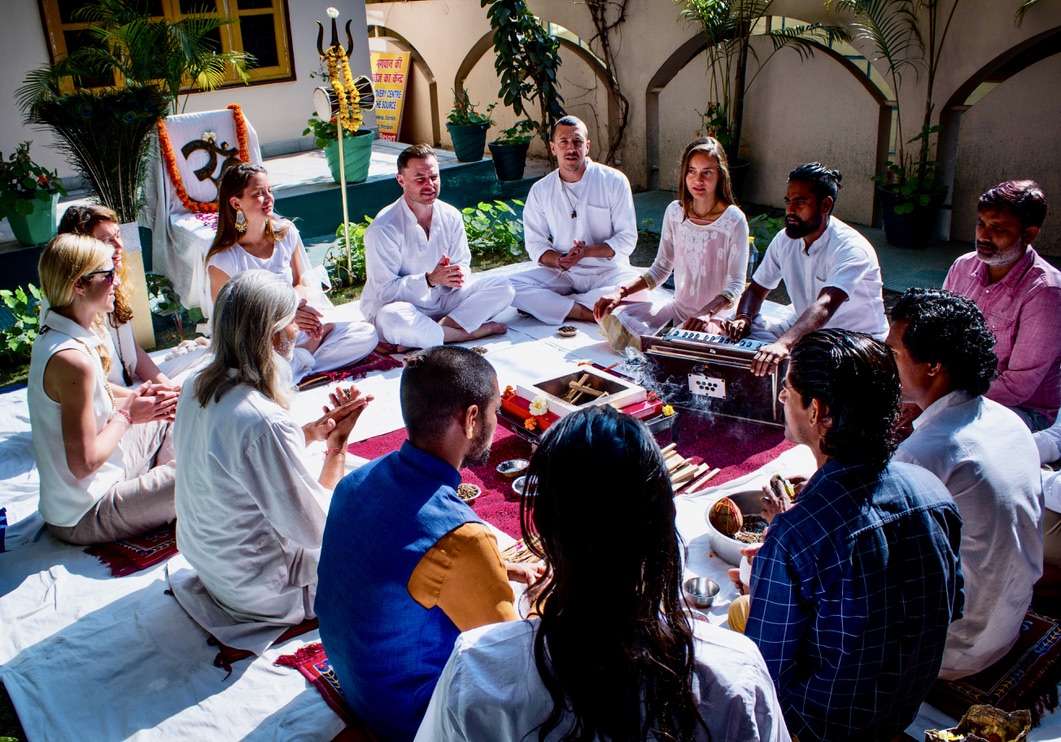 300 Hours Traditional Hatha Yoga Teacher Training Course in Rishikesh India incorporates a variety of topics. All these topics come under these following heads –
300 Hours Traditional Hatha Yoga Teacher Training Course in Rishikesh India incorporates a variety of topics. All these topics come under these following heads –
1. Techniques, Training and Practice – It incorporates several practices of Hatha Yoga which students will study in the Yoga Teacher Training Course. They are –
Asana – Postures of Hatha Yoga such as Standing, Supine, Prone – (backward, forward, spine twist), Inversion and Balance at intermediate and advance level.
Pranayama – Udar Svashan, Vaksha Svashan, Griva Svashan, Yogic Svashan, Kapalabhati, Bhastika, Nadi Shodhana, Sheetali, Sheetkari, Bhramari and Ujjayi. In addition, altogether 12 classical Pranayama.
Mudra – Specific, selected and important gesture to affect energy in body.
Bandha – Important locks to block the flow of energy in body (Jalandhara Bandha, Uddiyana Bandha and Moola Bandha).
Satkarma – Purificatory practices in Yoga (Laghu Sankhaprakshalana, Vaman, Jala Neti and Sutra Neti).
Meditation – Intermediate practices of Yoga Nidra, Intermediate Kaya asthairyam (stillness of body), Intermediate awarenss of breath, Antarmouna (inner slience) with conscious creation and disposal of thought and awareness and disposal of spontaneous thoughts, Japa (chanting) of sacred mantra or holy syllables with rosary, Ajapa Japa (spontaneous chanting) with awareness of frontal psychic passage and awareness of frontal psychic passage with SOHAM, Fundamental Dharana (concentration) practices and concentration with sacred mantra, Trataka (gazing) and Group meditation for universal peace and harmony.
2. Teaching Methodology – This is a combination of complex topics such as Designing Yoga class, How to teach different practices of Yoga, How to be good Yoga teacher, Ethical guidelines, Develop communication skills, Time management, Principles of demonstration, Assistance, Awareness, Correction, Styles of teaching, Specific needs of individuals in a Yoga class and Business aspects of Yoga teaching etc.
3. Anatomy and Physiology –
(a) Modern human anatomy and physiology – Overview and additional details of (Skeleton, Muscular, Digestive, Respiratory, Cardiovascular, Endocrine and Nervous system), Urinary system and Reproductive system (female and male), Immune System, Important Joints and their movements in different Asana and Important muscles and their movements in different Asana.
(b) Yoga human anatomy and physiology – Discussion on Human body according to Hatha Yoga and its relation to the study of human body in modern study regarding 3 Bodies, 5 elements, 5 Kosha, Prana, Mind, 5 Sense organs and 5 Motor organs, Nadi, Chakra and Kundalini.
(c) Holistic approach of Yoga – Learning how the system of Hatha Yoga needs to be incorporated for human well-being of body, mind, emotion and spirit.
4. Yoga Philosophy, Lifestyle and Ethics for Yoga Teachers – Overview of the fundamental topics from 200 Hours Hatha Yoga Teacher Training Course, Sristi (Creation) and Pralaya (Dissolution), Concept of Dharma, Dharma and Karma relation, Religion and its true essence with reference to comparative study of different faiths of the world, Hinduism – a way of living with reference to other ism’s as ways of living, Reflection on the life of great Gurus of different parts of the world with special reference to Swami Vivekananda, Bhakti Yoga as the Yoga of Kaliyuga, Yogic lifestyle, Ethics for a Yoga Teacher, Ethical guidelines as an individual and as a Yoga teacher and Yoga Sutra of Patanjali (important topics from all four chapters – Samadhi Pada, Sadhana Pada, Vibhuti Pada and Kaivalya Pada).
5. Practicum – Practice of teaching different practices in groups as the lead instructor, Observe and assist while others teaching, Focus on specific practices and Compiling feedback etc.
Suggested Yoga Books for 300 Hours Traditional Hatha Yoga Teacher Training Course –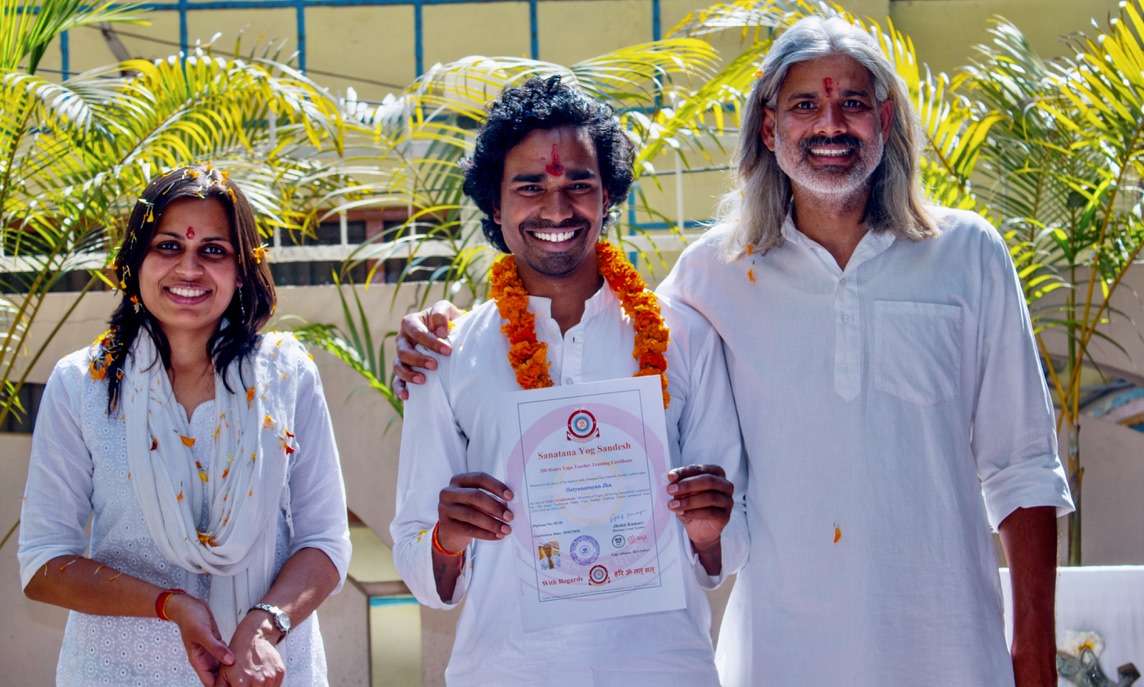
Asana Pranayama Mudra Bandha – Swami Satyananda Saraswati
Raja Yoga – Swami Vivekananda or
Four Chapters on Freedom – Swami Satyananda Saraswati
Yoga Darshan – Swami Niranjanananda Saraswati
Anatomy and Physiology – Not specified
 500 Hours Traditional Hatha Yoga Teacher Training Course in Rishikesh India (Split into 200 hours and 300 hours) incorporates a variety of topics. All these topics come under these following heads –
500 Hours Traditional Hatha Yoga Teacher Training Course in Rishikesh India (Split into 200 hours and 300 hours) incorporates a variety of topics. All these topics come under these following heads –
1. Techniques, Training and Practice – It incorporates several practices of Hatha Yoga which students will study in the Yoga Teacher Training Course. They are –
Asana – Postures of Hatha Yoga such as preparatory movements of joints, muscles and parts of body, Standing, Supine, Prone – (backward, forward, spine twist), Inversion and Balance at intermediate and advance level.
Pranayama – Udar Svashan, Vaksha Svashan, Griva Svashan, Yogic Svashan, Kapalabhati, Bhastika, Nadi Shodhana, Sheetali, Sheetkari, Bhramari and Ujjayi. In addition, altogether 12 classical Pranayama.
Mudra – Specific, selected and important gesture to affect energy in body.
Bandha – Important locks to block the flow of energy in body (Jalandhara Bandha, Uddiyana Bandha and Moola Bandha).
Satkarma – Purificatory practices in Yoga (Laghu Sankhaprakshalana, Vaman, Jala Neti and Sutra Neti).
Meditation – Fundamental and intermediate practices of Yoga Nidra, Yogic breathing with awareness, Fundamental practices of developing awareness, Kaya asthairyam (stillness of body) and its intermediate level, Awareness of natural breath and its intermediate level, Awareness of peace, Antarmouna (inner silence) with awareness of natural sensory responses, awareness of natural thought process, conscious creation and disposal of thought and awareness and disposal of spontaneous thoughts, Japa (chanting) of sacred mantra or holy syllables with rosary, Ajapa Japa (spontaneous chanting) with awareness of frontal psychic passage and awareness of frontal psychic passage with SOHAM, Developing awareness with mantra such as AUM, Fundamental Dharana (concentration) practices and concentration with sacred mantra, Trataka (gazing) and Group meditation for universal peace and harmony.
2. Teaching Methodology – This is a combination of complex topics such as Designing Yoga class, How to teach different practices of Yoga, How to be good Yoga teacher, Ethical guidelines, Develop communication skills, Time management, Principles of demonstration, Assistance, Awareness, Correction, Styles of teaching, Specific needs of individuals in a Yoga class and Business aspects of Yoga teaching etc.
3. Anatomy and Physiology –
(a) Modern human anatomy and physiology – Skeleton system, Muscular system, Digestive system Respiratory system, Cardiovascular System, Urinary and Reproductive system (Female and male), Endocrine system, Immune system, important Joints and their movements in different Asana and important muscles and their movements in different Asana.
(b) Yoga human anatomy and physiology – Discussion on Human body according to Hatha Yoga and its relation to the study of human body in modern study regarding 3 Bodies, 5 elements, 5 Kosha, Prana, Mind, 5 Sense organs and 5 Motor organs, Nadi, Chakra and Kundalini.
(c) Holistic approach of Yoga – Learning how the system of Hatha Yoga needs to be incorporated for human well-being of body, mind, emotion and spirit.
4. Yoga Philosophy, Lifestyle and Ethics for Yoga Teachers –
History – The term ‘Yoga’, Historical perspective of Yoga, Yoga in ancient texts, School’s lineage, style and methodology, Important dates and key ideas – Vedic period, Pre-classical era, Classical era, Middle Ages, Hatha Yoga 11 Century, Colonial era, Modern revival – 19th century with Swami Vivekananda and other great saints and Yogis, Vedas, Vedanta and Hatha, Historical context of Asana, Specific Asana from the school’s lineage, Historical context of Pranayama, Meditation methods by lineage and Ability to practice school’s chosen meditation practice.
Philosophy – Definition of Yoga, philosophy and key terms, Tradition of Yoga, Important scriptures of Yoga, Important Darshan (schools of philosophy), Branches of Yoga (Gyana Yoga, Karma Yoga, Bhakti Yoga, Raja Yoga, Hatha Yoga, Kundalini Yoga, Kriya Yoga, Nada Yoga, Swara Yoga and Mantra Yoga), Brahman and Atman, Yuga (age) and its characteristics, Individual existence (Sharira Traya, Pancha Tattva, Gyanendriya and Karmendriya, Antahkaran, Triguna, Pancha Kosha, Nadi, Prana Vayu, Chakra and Kundalini), Sad Bhava Vikar (six modifications of body), Sadurmi (six waves), Sadripu (six enemies), Karma, Mrityu and Punarjanma (death and reincarnation), Mukti, Key terms of meditation, Japa, Mantra, Mudra. Relationship between asana, pranayama and meditation with reference from Yoga sutra and according to school’s approach, Relationship, message and similarity between Yoga Sutra, Bhagavad Gita and Hatha Yoga Pradipika, Self-reflection on how philosophy relates to practice, Sristi (Creation) and Pralaya (Dissolution), Concept of Dharma, Dharma and Karma relation, Religion and its true essence with reference to comparative study of different faiths of the world, Hinduism – a way of living with reference to other ism’s as ways of living, reflection on the life of great Gurus of different parts of the world with special reference to Swami Vivekananda, Bhakti Yoga as the Yoga of Kaliyuga, Yogic lifestyle, Ethics for a Yoga Teacher, Ethical guidelines as an individual and as a Yoga teacher and Yoga Sutra of Patanjali (important topics from all four chapters – Samadhi Pada, Sadhana Pada, Vibhuti Pada and Kaivalya Pada).
5. Practicum – Practice of teaching different practices in groups as the lead instructor, Observe and assist while others teaching, Focus on specific practices and Compiling feedback etc.
Suggested Yoga Books for 500 Hours Traditional Hatha Yoga Teacher Training Course –
Asana Pranayama Mudra Bandha – Swami Satyananda Saraswati
Raja Yoga – Swami Vivekananda or
Four Chapters on Freedom – Swami Satyananda Saraswati
Yoga Darshan – Swami Niranjanananda Saraswati
Anatomy and Physiology – Not specified
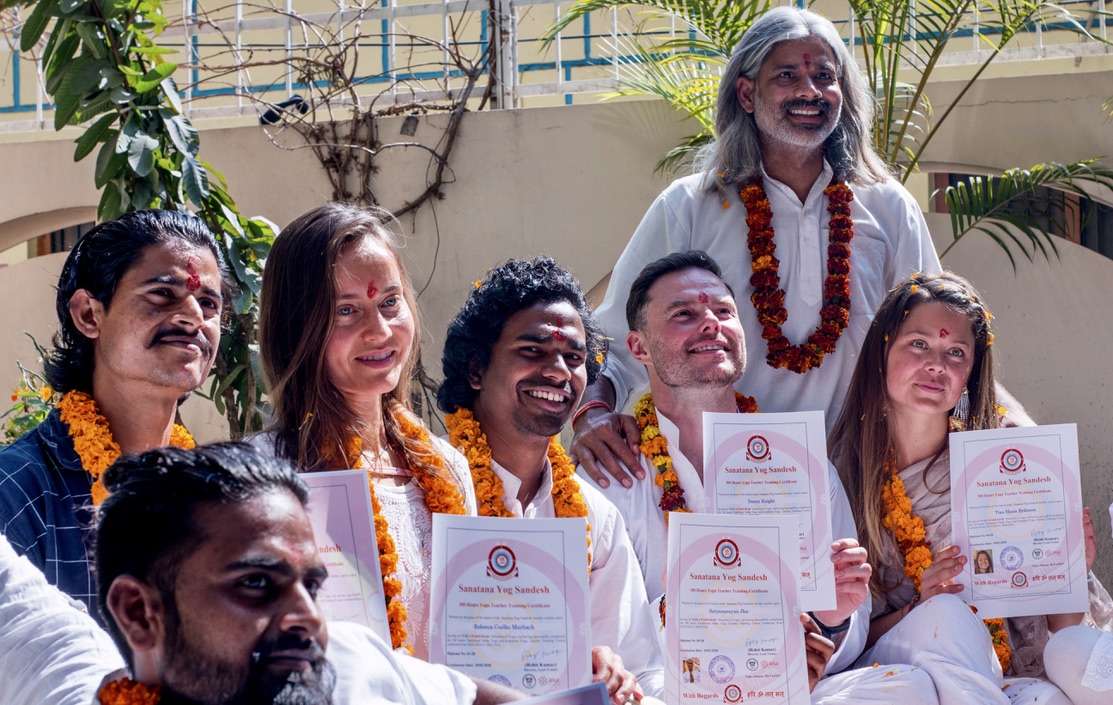 300 Hours Traditional Kriya Yoga Teacher Training Course incorporates a variety of topics. All these topics come under these following heads –
300 Hours Traditional Kriya Yoga Teacher Training Course incorporates a variety of topics. All these topics come under these following heads –
1. Techniques, Training and Practice – It includes several levels of practices with designed orientation, breathing and visualization which students will study in the Kriya Yoga Teacher Training Course. They are –
Special Kriya of Kriya Yoga – 20 special and specific Kriya as taught by Swami Satyananda Saraswati, which forms the essence of Kriya Yoga.
Asana – Very selective and specific postures of Hatha Yoga such as Standing, Supine, Prone – (backward, forward, spine twist), Inversion, Balance, specific Padmasana Asana and Vajrasana Asana (Lotus and Thunderbolt series postures) in a prescribed sequence for Kriya Yoga purposes.
Pranayama – Higher techniques of breathings with awareness, visualization, retention, use of Mudra and Bandha (Yogic Svashan, Kapalabhati, Bhastika, Nadi Shodhana, Sheetali, Sheetkari, Bhramari, Ujjayi, Surya Bheda and Moorcha). In addition, altogether 12 classical Pranayama.
Mudra – Specific, selected and important gesture to affect energy in body.
Bandha – Important locks to block the flow of energy in body (Jalandhara Bandha, Uddiyana Bandha, Moola Bandha and Maha Bandha).
Satkarma – Purificatory practices in Yoga (Laghu Sankhaprakshalana, Vaman, Jala Neti and Sutra Neti).
Meditation – Fundamental and intermediate practices of Yoga Nidra, Yogic breathing with awareness, Fundamental practices of developing awareness, Kaya asthairyam (stillness of body) and its intermediate level, Awareness of natural breath and its intermediate level, Awareness of peace, Antarmouna (inner silence) with awareness of natural sensory responses, awareness of natural thought process, conscious creation and disposal of thought and awareness and disposal of spontaneous thoughts, Japa (chanting) of sacred mantra or holy syllables with rosary, Ajapa Japa (spontaneous chanting) with awareness of frontal psychic passage and awareness of frontal psychic passage with SOHAM, Developing awareness with mantra such as AUM, Fundamental Dharana (concentration) practices and concentration with sacred mantra, Trataka (gazing), Specific Kriya Yoga meditation and Group meditation for universal peace and harmony.
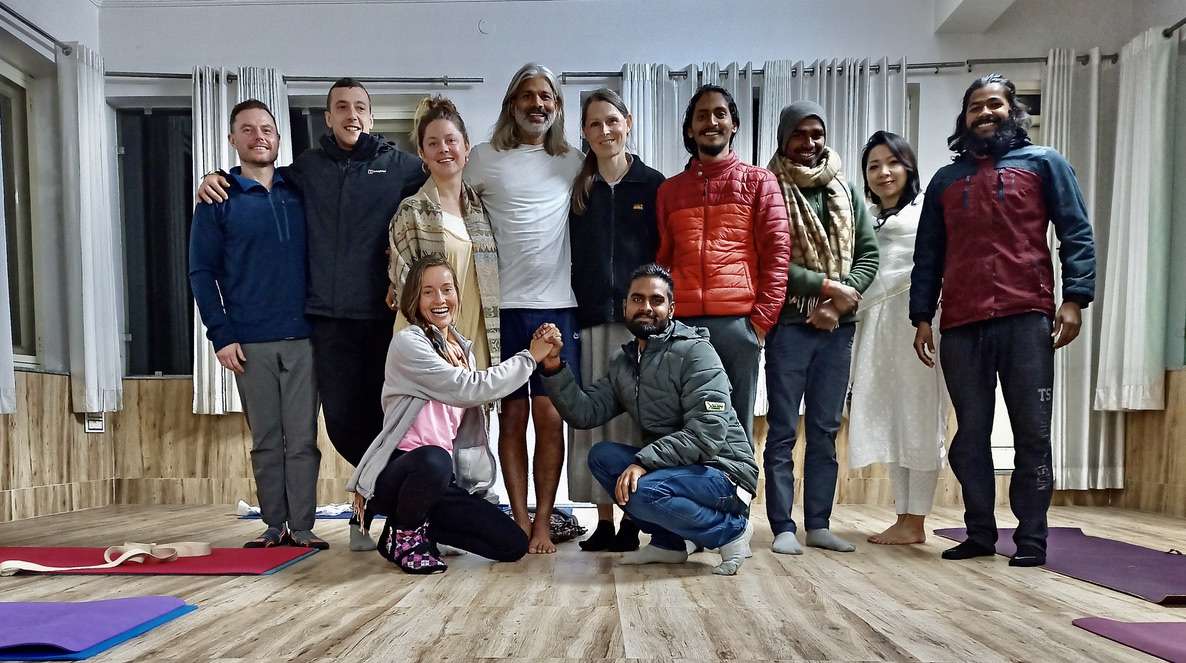 2. Teaching Methodology – This is a combination of complex topics such as Designing a Kriya Yoga class, How to teach different practices of Kriya Yoga, How to be good Kriya Yoga teacher, Ethical guidelines, Develop communication skills, Time management, Principles of demonstration, Assistance, Awareness, Correction, Styles of teaching, Specific needs of individuals in a Yoga class and Business aspects of Yoga teaching etc.
2. Teaching Methodology – This is a combination of complex topics such as Designing a Kriya Yoga class, How to teach different practices of Kriya Yoga, How to be good Kriya Yoga teacher, Ethical guidelines, Develop communication skills, Time management, Principles of demonstration, Assistance, Awareness, Correction, Styles of teaching, Specific needs of individuals in a Yoga class and Business aspects of Yoga teaching etc.
3. Anatomy and Physiology –
(a) Modern human anatomy and physiology – Overview and additional details of (Skeletal, Muscular, Digestive, Respiratory, Cardiovascular, Endocrine and Nervous system with regards to Kriya Yoga and its practices), Urinary system and Reproductive system (female and male), Immune System, Important Joints and their movements in different Asana and Important muscles and their movements in different Asana.
(b) Yoga human anatomy and physiology – Discussion on Human body according to Kriya Yoga and its relation to the study of human body in modern study regarding 3 Bodies, 5 elements, 5 Kosha, Prana, Mind, 5 Sense organs and 5 Motor organs, Nadi, Chakra and Kundalini.
(c) Holistic approach of Yoga – Learning how the system of Kriya Yoga needs to be incorporated for human well-being of body, mind, emotion and spirit.
4. Yoga Philosophy, Lifestyle and Ethics for Yoga Teachers – Overview of the fundamental topics from 200 Hours Hatha Yoga Teacher Training Course, Sristi (Creation) and Pralaya (Dissolution), Concept of Dharma, Dharma and Karma relation, Religion and its true essence with reference to comparative study of different faiths of the world, Hinduism – a way of living with reference to other ism’s as ways of living, Reflection on the life of great Gurus of different parts of the world with special reference to Swami Vivekananda, Bhakti Yoga as the Yoga of Kaliyuga, Kriya Yoga, History of Kriya Yoga, Development of Kriya Yoga, Important schools of Kriya Yoga, Great teachers of Kriya Yoga, Concept and methodology of Kriya Yoga, Aspects of Kriya Yoga for spiritual evolution, Yogic lifestyle, Ethics for a Yoga Teacher, Ethical guidelines as an individual and as a Yoga teacher.
5. Practicum – Practice of teaching different practices in groups as the lead instructor, Observe and assist while others teaching, Focus on specific practices and Compiling feedback etc.
Karma Yoga – During the course individuals undergo experiences which require those to be assimilated within for which Karma Yoga is the best means. Depending upon the requirements we many incorporate this as well.
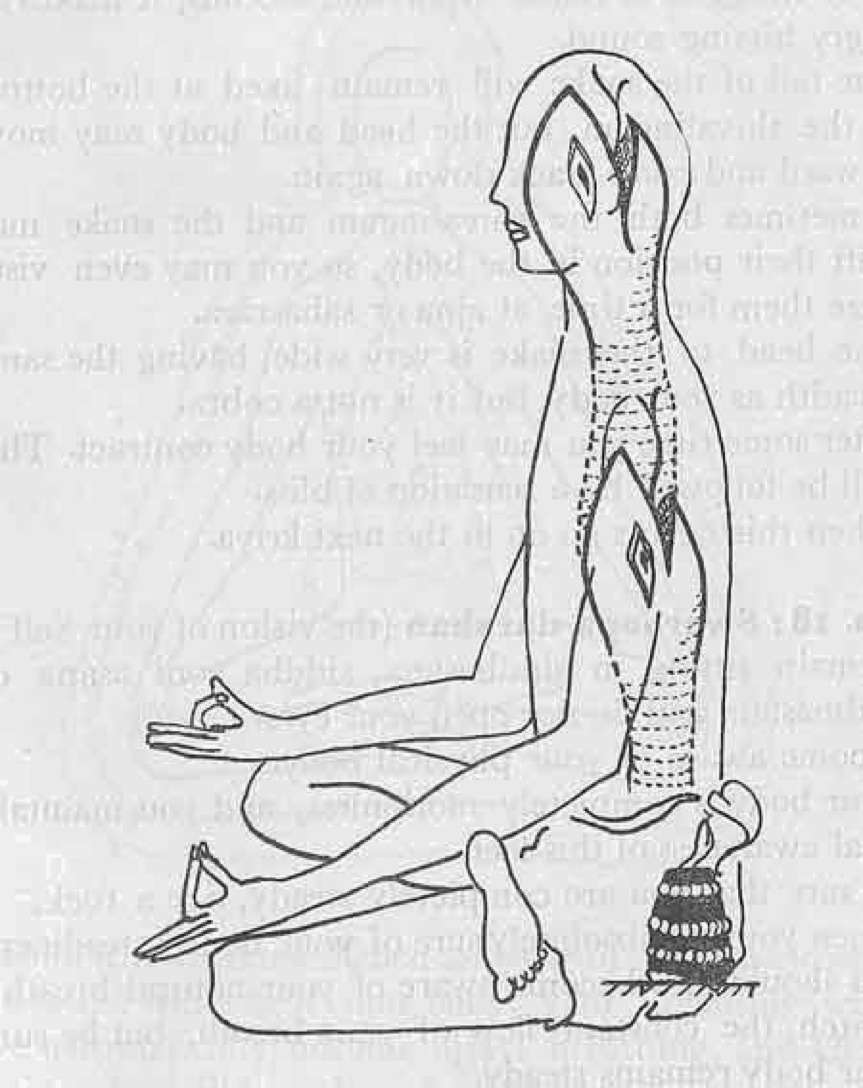 Suggested Yoga Books for 300 Hours Traditional Kriya Yoga Teacher Training Course –
Suggested Yoga Books for 300 Hours Traditional Kriya Yoga Teacher Training Course –
Yoga and Kriya – Swami Satyananda Saraswati
Kundalini Tantra – Swami Satyananda Saraswati
Kundalini Yoga – Swami Sivananda Saraswati
Asana Pranayama Mudra Bandha – Swami Satyananda Saraswati
Prana and Pranayama – Swami Niranjanananda Saraswati
The Science of Pranayama – Swami Sivananda Saraswati
Raja Yoga – Swami Vivekananda
Anatomy and Physiology – Not specified
 300 Hours Traditional Kundalini Yoga Teacher Training Course in Rishikesh India incorporates a unique blend of practices from various branches of Yoga. They come under the following heads –
300 Hours Traditional Kundalini Yoga Teacher Training Course in Rishikesh India incorporates a unique blend of practices from various branches of Yoga. They come under the following heads –
1. Techniques, Training and Practice – Several practices with designed orientation, breathing, awareness, visualization and devotion come in this category. They are –
Asana – Very specific and selective postures of Hatha Yoga such as Standing, Supine, prone – (backward, forward, spine twist), Inversion, Balance, Specific Padmasana Asana and Vajrasana Asana (Lotus and Thunderbolt series postures) in a prescribed sequence for Kundalini Yoga purposes.
Pranayama – Higher techniques of breathings with awareness, visualization, retention, use of Mudra and Bandha (Yogic Svashan, Kapalabhati, Bhastika, Nadi Shodhana, Sheetali, Sheetkari, Bhramari, Ujjayi, Surya Bheda and Moorcha). In addition, altogether 12 classical Pranayama with aim to stimulate special Nadi, Prana, Chakra and Kundalini.
Mudra – Specific, selected and important gesture to affect energy in body. In addition, 10 specific and very important mudra from ancient scriptures expressed by enlightened Yogis for Kundalini awakening.
Bandha – Important locks to block the flow of energy in body (Jalandhara Bandha, Uddiyana Bandha, Moola Bandha and Maha Bandha).
Satkarma – Purificatory practices in Yoga (Laghu Sankhaprakshalana, Vaman, Jala Neti and Sutra Neti).
Meditation – Fundamental and intermediate practices of Yoga Nidra with Chakra awareness, Yogic breathing with awareness, Fundamental practices of developing awareness, Kaya asthairyam (stillness of body) and its intermediate level, Awareness of natural breath and its intermediate level, Awareness of peace, Antarmouna (inner silence) with awareness of natural sensory responses, awareness of natural thought process, conscious creation and disposal of thought and awareness and disposal of spontaneous thoughts, Japa (chanting) of sacred mantra or holy syllables with rosary, Ajapa Japa (spontaneous chanting) with awareness of frontal psychic passage and awareness of frontal psychic passage with SOHAM, Developing awareness with mantra such as AUM, Fundamental Dharana (concentration) practices and concentration with sacred mantra, Trataka (gazing), Dharana (concentration) on pancha tattva (five elements), Nadi (channel), Prana, Chakra (seven chakra) and Kundalini, Void meditation and Group meditation for universal peace and harmony.
Mantra – Special mantra chanting, their meaning and further explanation to use them as a form of meditation for greater understanding and experience.
Devotional practices – Specific rituals, prayers, special mantra, moral guidelines, disciplines and additional practices for unified experience.
2. Teaching Methodology – This is a combination of complex topics such as Designing Kundalini Yoga class, How to teach different Kundalini practices, How to be good Yoga teacher, Ethical guidelines, Develop communication skills, Time management, Principles of demonstration, Assistance, Awareness, Correction, Styles of teaching, Specific needs of individuals in a Yoga class and Business aspects of Yoga teaching etc.
3. Anatomy and Physiology –
(a) Modern human anatomy and physiology – Overview and additional details of (Skeleton, Muscular, Digestive, Respiratory, Cardiovascular, Endocrine and Nervous system with regards to Kundalini Yoga and its practices), Urinary system and Reproductive system (female and male), Immune System, Important Joints and their movements in different Asana and Important muscles and their movements in different Asana.
(b) Yoga human anatomy and physiology – Discussion on Human body according to Kundalini Yoga and its relation to the study of human body in modern study regarding 3 Bodies, 5 elements, 5 Kosha, Prana, Mind, 5 Sense organs and 5 Motor organs, Nadi, Chakra and Kundalini.
(c) Holistic approach of Yoga – Learning how the system of Kundalini Yoga needs to be incorporated for human well-being of body, mind, emotion and spirit.
4. Yoga Philosophy, Lifestyle and Ethics for Yoga Teachers – Overview of the fundamental topics from 200 Hours Hatha Yoga Teacher Training Course, Sristi (Creation) and Pralaya (Dissolution), Concept of Dharma, Dharma and Karma relation, Religion and its true essence with reference to comparative study of different faiths of the world, Hinduism – a way of living with reference to other ism’s as ways of living, Reflection on the life of great Gurus of different parts of the world with special reference to Swami Vivekananda, Bhakti Yoga as the Yoga of Kaliyuga, Kundalini Yoga, History of Kundalini Yoga, Development of Kundalini Yoga, Important schools of Kundalini Yoga, Great teachers of Kundalini Yoga, Human body according to Kundalini Yoga (3 bodies, 5 elements, 5 Koshas, 5 Pranas, 5 Sense organs and 5 Motor organs, Mind, Nadi, Chakra and Kundalini according to ancient scriptures), Concept and methodology of Kundalini Yoga, Aspects of Kundalini Yoga for spiritual evolution, Ancient scriptures on Kundalini Yoga which is Shiva Samhita (Pratham Patal, Dvitiya Patal, Tritiya Patal, Chaturtha Patal and Pancham Patal), Yogic lifestyle, Ethics for a Yoga Teacher, Ethical guidelines as an individual and as a Yoga teacher.
5. Practicum – Practice of teaching different practices in groups as the lead instructor, Observe and assist while others teaching, Focus on specific practices and Compiling feedback etc.
Karma Yoga – During the course individuals undergo psychic experiences which require to be assimilated within. For this Karma Yoga is the best means. Depending upon the requirements we many incorporate this as well.
Suggested Yoga Books for 300 Hours Traditional Kundalini Yoga Teacher Training Course –
Kundalini Tantra – Swami Satyananda Saraswati
Kundalini Yoga – Swami Sivananda Saraswati
Shiva Samhita – Any translation
Asana Pranayama Mudra Bandha – Swami Satyananda Saraswati
Prana and Pranayama – Swami Niranjanananda Saraswati
The Science of Pranayama – Swami Sivananda Saraswati
Raja Yoga – Swami Vivekananda
Anatomy and Physiology – Not specified
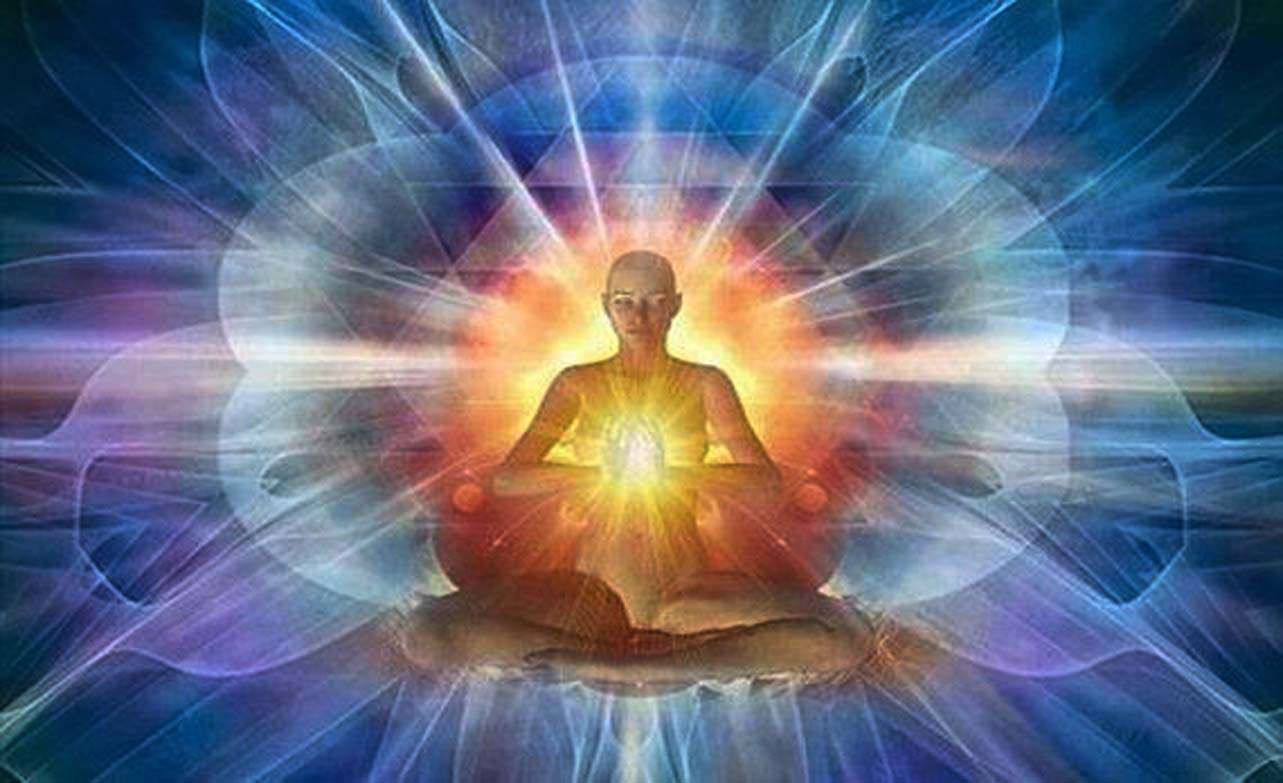 300 Hours Traditional Raja Yoga Teacher Training Course in Rishikesh India (Traditional Meditation Teacher Training Course in Rishikesh India) incorporates a series of subtle topics for study and practice. All these topics come under these following heads –
300 Hours Traditional Raja Yoga Teacher Training Course in Rishikesh India (Traditional Meditation Teacher Training Course in Rishikesh India) incorporates a series of subtle topics for study and practice. All these topics come under these following heads –
1. Techniques, Training and Practice – It incorporates several practices of Raja Yoga including important practices of Hatha Yoga as well for greater efficiency into Raja Yoga which students will study in the Yoga Teacher Training Course. They are –
Asana – Specific postures from Hatha Yoga such as Standing, Supine, Prone – (backward, forward, spine twist), Inversion, Balance, specific Padmasana Asana and Vajrasana Asana (Lotus and Thunderbolt series postures) in a prescribed sequence for Raja Yoga purposes.
Pranayama – Higher techniques of breathings with awareness, visualization, retention, use of Mudra and Bandha (Yogic Svashan, Kapalabhati, Bhastika, Nadi Shodhana, Sheetali, Sheetkari, Bhramari, Ujjayi, Surya Bheda and Moorcha). In addition, altogether 12 classical Pranayama. Special focus on Nadi Shodhana Pranayama as a means of purification of Nadi and sense control as described by Swami Vivekananda.
Mudra – Specific, selected and important gesture to affect energy in body.
Bandha – Important locks to block the flow of energy in body (Jalandhara Bandha, Uddiyana Bandha, Moola Bandha and Maha Bandha).
Satkarma – Purificatory practices in Yoga (Laghu Sankhaprakshalana, Vaman, Jala Neti and Sutra Neti).
Meditation – Fundamental and intermediate practices of Yoga Nidra, Yogic breathing with awareness, Fundamental practices of developing awareness, Kaya asthairyam (stillness of body) and its intermediate level, Awareness of natural breath and its intermediate level, Awareness of peace, Antarmouna (inner silence) with awareness of natural sensory responses, awareness of natural thought process, conscious creation and disposal of thought and awareness and disposal of spontaneous thoughts, Japa (chanting) of sacred mantra or holy syllables with rosary, Ajapa Japa (spontaneous chanting) with awareness of frontal psychic passage and awareness of frontal psychic passage with SOHAM, Developing awareness with mantra such as AUM, Fundamental Dharana (concentration) practices and concentration with sacred mantra, Trataka (gazing), Various methods of Dharana (concentration) practices described in Yoga Sutra of Patanjali and Group meditation for universal peace and harmony.
Moral Practices – Practices of Yama, Niyama and other moral practices relevant to spiritual growth.
2. Teaching Methodology – This is a combination of complex topics such as Designing Raja Yoga class, How to teach different practices of Yoga, How to be good Yoga teacher, Ethical guidelines, Develop communication skills, Time management, Principles of demonstration, Assistance, Awareness, Correction, Styles of teaching, Specific needs of individuals in a Yoga class and Business aspects of Yoga teaching etc.
3. Anatomy and Physiology –
(a) Modern human anatomy and physiology – Overview and additional details of (Skeleton, Muscular, Digestive, Respiratory, Cardiovascular, Endocrine and Nervous system with regards to Raja Yoga and its practices), Urinary system and Reproductive system (female and male), Immune System, Important Joints and their movements in different Asana and Important muscles and their movements in different Asana.
(b) Yoga human anatomy and physiology – Discussion on Human body according to Raja Yoga and its relation to the study of human body in modern study regarding 3 Bodies, 5 elements, 5 Kosha, Prana, Mind, 5 Sense organs and 5 Motor organs, Nadi, Chakra and Kundalini.
(c) Holistic approach of Yoga – Learning how the system of Raja Yoga needs to be incorporated for human well-being of body, mind, emotion and spirit.
4. Yoga Philosophy, Lifestyle and Ethics for Yoga Teachers – Overview of the fundamental topics from 200 Hours Hatha Yoga Teacher Training Course, Sristi (Creation) and Pralaya (Dissolution), Concept of Dharma, Dharma and Karma relation, Religion and its true essence with reference to comparative study of different faiths of the world, Hinduism – a way of living with reference to other ism’s as ways of living, Reflection on the life of great Gurus of different parts of the world with special reference to Swami Vivekananda, Bhakti Yoga as the Yoga of Kaliyuga, Raja Yoga, History of Raja Yoga, Development of Raja Yoga, Important schools of Raja Yoga, Great teachers of Raja Yoga, Raja Yoga in the ancient scripture Kurma Purana, Concept and methodology of Raja Yoga, Yoga Sutra of sage Patanjali as an important scripture of Raja Yoga as described by Swami Vivekannada, Yoga Sutra of Sage Patanjali (important topics from all four chapters – Samadhi Pada, Sadhana Pada, Vibhuti Pada and Kaivalya Pada), Aspects of Raja Yoga for spiritual evolution, Yogic lifestyle, Ethics for a Yoga Teacher, Ethical guidelines as an individual and as a Yoga teacher.
5. Practicum – Practice of teaching different practices in groups as the lead instructor, Observe and assist while others teaching, Focus on specific practices and Compiling feedback etc.
Suggested Yoga Books for 300 Hours Traditional Raja Yoga Teacher Training Course –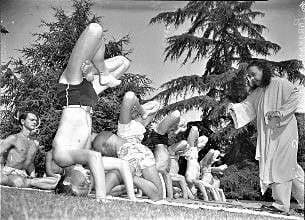
Asana Pranayama Mudra Bandha – Swami Satyananda Saraswati
Raja Yoga – Swami Vivekananda or
Four Chapters on freedom – Swami Satyananda Saraswati
Yoga Darshan – Swami Niranjanananda Saraswati
Anatomy and Physiology – Not specified
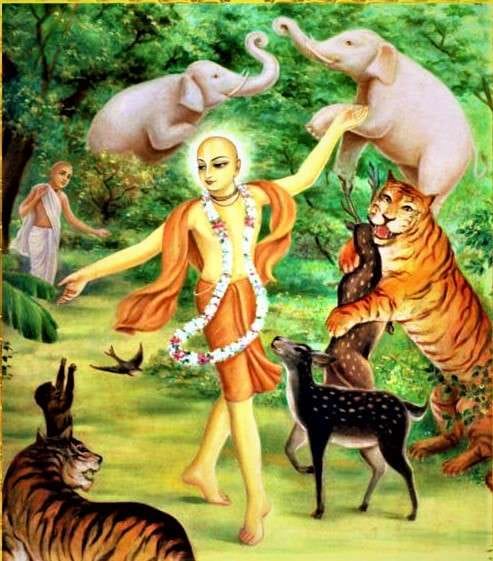 300 Hours Traditional Bhakti Yoga Teacher Training Course incorporates a series of subtle topics for study and practice. All these topics come under these following heads –
300 Hours Traditional Bhakti Yoga Teacher Training Course incorporates a series of subtle topics for study and practice. All these topics come under these following heads –
1. Techniques, Training and Practice – It incorporates several practices of Bhakti Yoga including important practices of Hatha Yoga as well for greater efficiency into Bhakti Yoga which students will study in the Bhakti Yoga Teacher Training Course. They are –
Asana – Postures of Hatha Yoga such as preparatory movements of joints, muscles and parts of body, Standing, Supine, Prone – (backward, forward, spine twist), Inversion, Balance, specific Padmasana Asana and Vajrasana Asana (Lotus and Thunderbolt series postures) in a prescribed sequence for Bhakti Yoga purposes.
Pranayama – Higher techniques of breathings with awareness, visualization, retention, use of Mudra and Bandha (Yogic Svashan, Kapalabhati, Bhastika, Nadi Shodhana, Sheetali, Sheetkari, Bhramari, Ujjayi, Surya Bheda and Moorcha). In addition, altogether 12 classical Pranayama. Special focus on Nadi Shodhana Pranayama for Mantra chanting and performing rituals.
Mudra – Specific, selected and important gesture to affect energy in body.
Bandha – Important locks to block the flow of energy in body (Jalandhara Bandha, Uddiyana Bandha, Moola Bandha and Maha Bandha).
Satkarma – Purificatory practices in Yoga (Laghu Sankhaprakshalana, Vaman, Jala Neti and Sutra Neti).
Meditation – Fundamental and intermediate practices of Yoga Nidra, Yogic breathing with awareness, Fundamental practices of developing awareness, Kaya asthairyam (stillness of body) and its intermediate level, Awareness of natural breath and its intermediate level, Awareness of peace, Developing awareness with mantra such as AUM, Fundamental Dharana (concentration) practices and concentration with sacred mantra, Trataka (gazing), Saguna Meditation (on the forms of God and enlightened saints), Various methods of Dharana (concentration) practices described in Bhakti Sutra of Sage Narada and Group meditation for universal peace and harmony.
 Rituals and Kirtan – Orthodox Panchopchar, Astopchar and Sodsopchar methods of ritual to worship any form of God, Unorthodox methods of rituals to worship God, Kirtan with sacred names of God and Orthodox & unorthodox prayers.
Rituals and Kirtan – Orthodox Panchopchar, Astopchar and Sodsopchar methods of ritual to worship any form of God, Unorthodox methods of rituals to worship God, Kirtan with sacred names of God and Orthodox & unorthodox prayers.
Moral Practices – Practices of Yama, Niyama and other moral practices relevant to spiritual growth.
2. Teaching Methodology – This is a combination of complex topics such as Designing Bhakti Yoga class, How to teach different practices of Yoga, How to be a good Yoga teacher, Ethical guidelines, Develop communication skills, Time management, Principles of demonstration, Assistance, Awareness, Correction, Styles of teaching, Specific needs of individuals in a Yoga class and Business aspects of Yoga teaching etc.
3. Anatomy and Physiology –
(a) Modern human anatomy and physiology – Overview and additional details of (Skeleton, Muscular, Digestive, Respiratory, Cardiovascular, Endocrine and Nervous system with regards to Bhakti Yoga and its practices), Urinary system and Reproductive system (female and male), Immune System, Important Joints and their movements in different Asana and Important muscles and their movements in different Asana.
(b) Yoga human anatomy and physiology – Discussion on Human body according to Bhakti Yoga and its relation to the study of human body in modern study regarding 3 Bodies, 5 elements, 5 Kosha, Prana, Mind, 5 Sense organs and 5 Motor organs, Nadi, Chakra and Kundalini.
(c) Holistic approach of Yoga – Learning how the system of Bhakti Yoga needs to be incorporated for human well-being of body, mind, emotion and spirit.
4. Yoga Philosophy, Lifestyle and Ethics for Yoga Teachers – Overview of the fundamental topics from 200 Hours Hatha Yoga Teacher Training Course, Sristi (Creation) and Pralaya (Dissolution), Concept of Dharma, Dharma and Karma relation, Religion and its true essence with reference to comparative study of different faiths of the world, Hinduism – a way of living with reference to other ism’s as ways of living, Reflection on the life of great Gurus of different parts of the world with special reference to Swami Vivekananda, Bhakti Yoga as the Yoga of Kaliyuga, History of Bhakti Yoga, Development of Bhakti Yoga, Important schools of Bhakti Yoga, Great teachers of Bhakti Yoga, Bhakti Yoga in the ancient scriptures of world, Concept and methodology of Bhakti Yoga, Bhakti Sutra of Sage Narada as an important scripture of Bhakti Yoga as described by Swami Sivananda, Aspects of Bhakti Yoga for spiritual evolution, Yogic lifestyle, Ethics for a Yoga Teacher, Ethical guidelines as an individual and as a Yoga teacher. 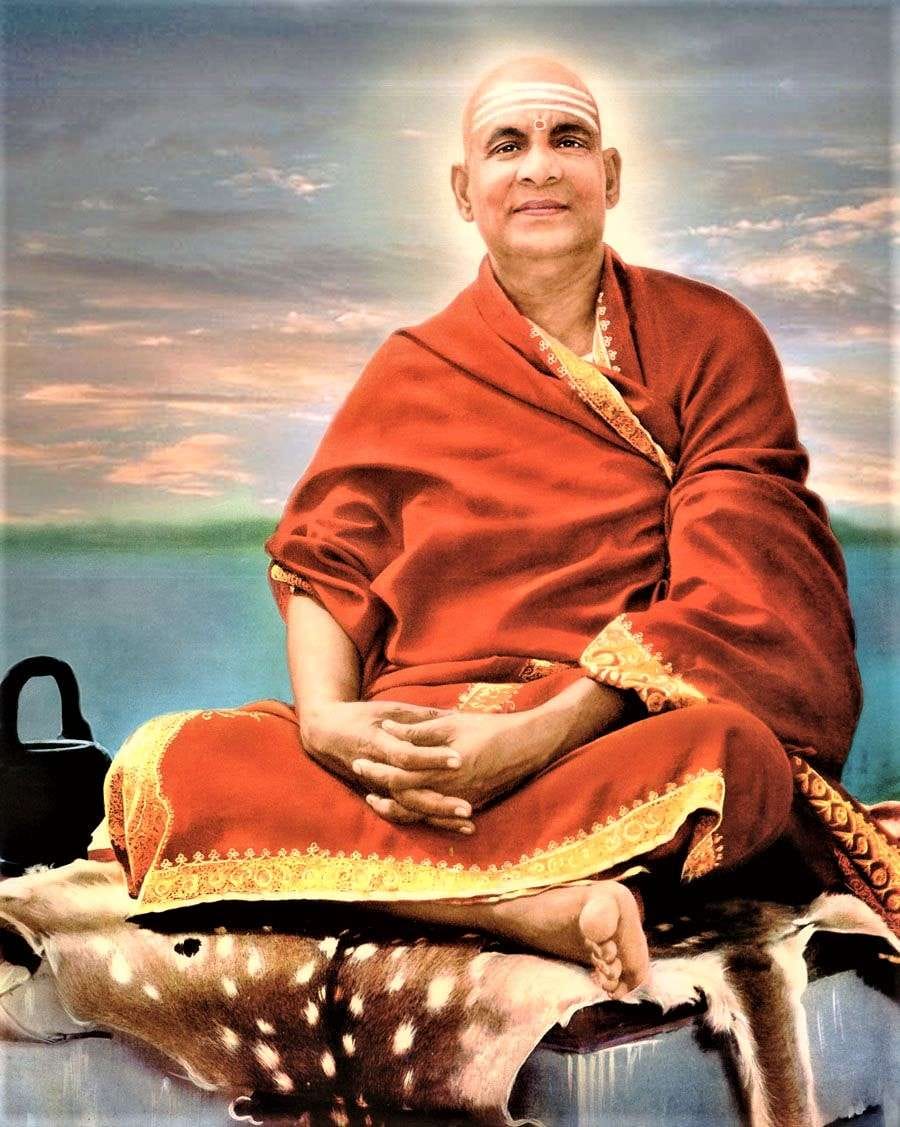
5. Practicum – Practice of teaching different practices in groups as the lead instructor, Observe and assist while others teaching, Focus on specific practices and Compiling feedback etc.
Suggested Yoga Books for 300 Hours Traditional Bhakti Yoga Teacher Training Course –
Asana Pranayama Mudra Bandha – Swami Satyananda Saraswati
Narada Bhakti Sutra Yoga – Swami Sivananda
Yoga Darshan – Swami Niranjanananda Saraswati
Anatomy and Physiology – Not specified
Yoga Retreat Curriculum
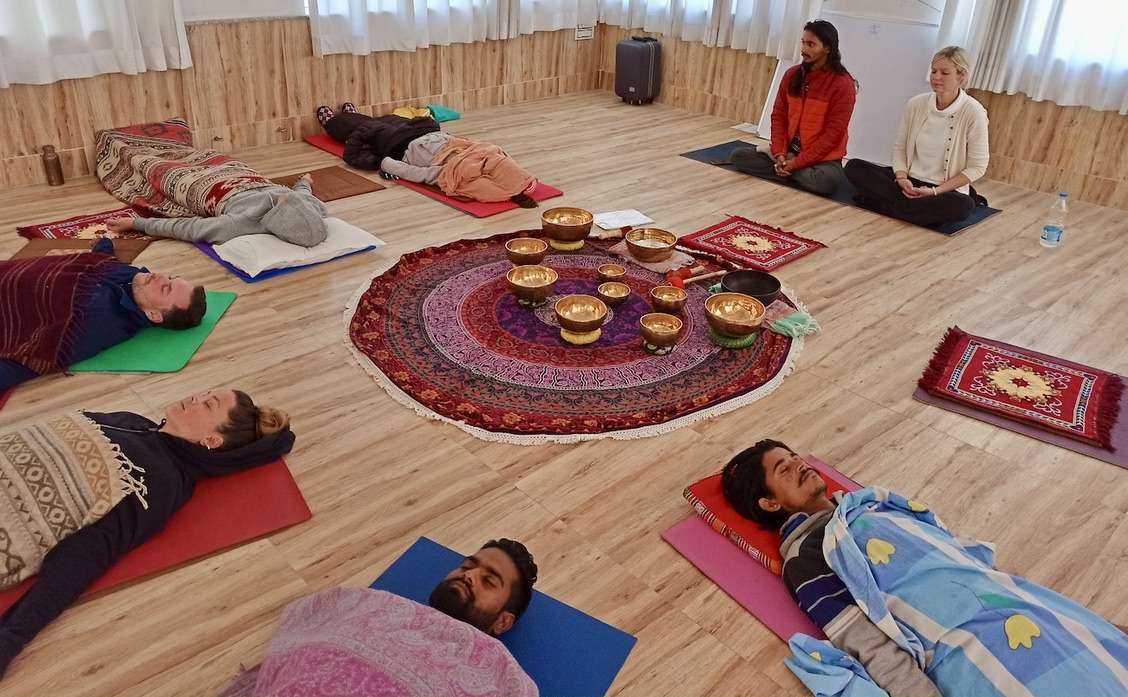 Yoga Retreat in Rishikesh India incorporates several topics which helps one to enter into Yogic culture. They are –
Yoga Retreat in Rishikesh India incorporates several topics which helps one to enter into Yogic culture. They are –
Hatha Yoga Asana – Different basic postures of Hatha Yoga such as such as preparatory movements of joints, muscles and parts of body, Standing, Supine, Prone – (backward, forward, spine twist), Inversion and Balance.
Pranayama – Udar Svashan, Vaksha Svashan, Griva Svashan, Yogic Svashan, Kapalabhati, Nadi Shodhana, Bhramari and Ujjayi.
Mudra – Basic gesture of hands, fingers and body to affect energy in body.
Satkarma – Practices for purification of body in Yoga (Jala Neti).
Meditation – Fundamental practices of Yoga Nidra, Yogic breathing with awareness, Fundamental practices of developing awareness, Kaya asthairyam (stillness of body), Awareness of natural breath, Awareness of peace and Developing awareness with mantra such as AUM.
Some other important topics – How to do different practices of Yoga, How to make a Yoga program, Ethical guidelines, Human anatomy, Teaching methodology, Yogic life style and Holistic approach of Yoga.
Karma Yoga – During the retreat individuals would be required those to participate into Karma Yoga. Depending upon the requirements we may involve you into this.
 Suggested Yoga Books for Yoga Retreat –
Suggested Yoga Books for Yoga Retreat –
Asana Pranayama Mudra Bandha – Swami Satyananda Saraswati
Raja Yoga – Swami Vivekananda or
Four Chapters on freedom – Swami Satyananda Saraswati
Anatomy and Physiology – Not specified
 Meditation Retreat in Rishikesh India incorporates several topics which helps one to enter into Yogic culture of meditation. They are –
Meditation Retreat in Rishikesh India incorporates several topics which helps one to enter into Yogic culture of meditation. They are –
Hatha Yoga Asana – Different basic postures of Hatha Yoga such as such as preparatory movements of joints, muscles and parts of body, Standing, Supine, Prone – (backward, forward and spine twist), Inversion and Balance, specific Asana helpful for relaxation and meditation such as Shavasana, Sukhasana, Ardha Padmasana, Padmasana, Siddhasana, Siddha Yoni Asana, Swastikasana, Dhyana Veerasana, Vajrasana and Padadhirasana etc.
Pranayama – Udar Svashan, Vaksha Svashan, Griva Svashan, Yogic Svashan, Nadi Shodhana, Bhramari and Ujjayi with special method which helps towards meditation.
Mudra – Some basic gesture of fingers and body to affect energy in body such as – Jnana, China, Bhirava & Bhairavi etc.
Satkarma – Practices for purification of body in Yoga (Jala Neti).
Meditation – Fundamental practices of Yoga Nidra, Yogic breathing with awareness, Fundamental practices of developing awareness, Kaya asthairyam (stillness of body), Awareness of natural breath, Awareness of peace, Bhao aaropan (Awareness of feelings), Developing awareness with mantra such as AUM, Sharir darshan (Body awareness), Awareness of certain symbols, Chakra Awareness and Atmanubhav (Self-awareness).
Lecture on Some important topics – How to do different practices of Yoga, How to make program, Ethical guidelines, Yogic life style and Holistic approach of Yoga.
Karma Yoga – During the retreat individuals would be required those to participate into Karma Yoga. Depending upon the requirements we may involve you into this.

Suggested Yoga Books for Meditation Retreat –
Asana Pranayama Mudra Bandha – Swami Satyananda Saraswati
Raja Yoga – Swami Vivekananda or
Four Chapters on Freedom – Swami Satyananda Saraswati
Yoga Darshan – Swami Niranjanananda Saraswati
Anatomy and Physiology – Not specified
 100 Hours Women Yoga Training Retreat in Rishikesh India incorporates several topics of theory and practical which helps one to understand and know the Yogic culture for women. They are –
100 Hours Women Yoga Training Retreat in Rishikesh India incorporates several topics of theory and practical which helps one to understand and know the Yogic culture for women. They are –
1. Techniques, Training and Practice –
Hatha Yoga Asana – Different basic postures of Hatha Yoga specifically designed and very important for women such as preparatory movements of joints, muscles and parts of body, Standing, Supine, Prone – (backward, forward, spine twist), Inversion and Balance.
Pranayama – With special guidelines for women such as Udar Svashan, Vaksha Svashan, Griva Svashan, Yogic Svashan, Kapalabhati, Nadi Shodhana, Bhramari and Ujjayi.
Mudra – Basic gesture of hands, fingers and body especially for women to affect energy in body.
Bandha – Practices for locking the energy in body.
Satkarma – Practices for purification of body in Yoga (Jala Neti).
Meditation – Fundamental practices of Yoga Nidra, Yogic breathing with awareness, Fundamental practices of developing awareness, Kaya asthairyam (stillness of body), Awareness of natural breath, Awareness of peace, Bhao aaropan (Awareness of feelings), Developing awareness with mantra such as AUM, Sharira darshan (Body awareness), Awareness of certain symbols, Chakra Awareness and Atmanubhav (Self-awareness).
Karma Yoga – During the retreat individuals would be required those to participate in Karma Yoga. Depending upon the requirements we may involve you into this.
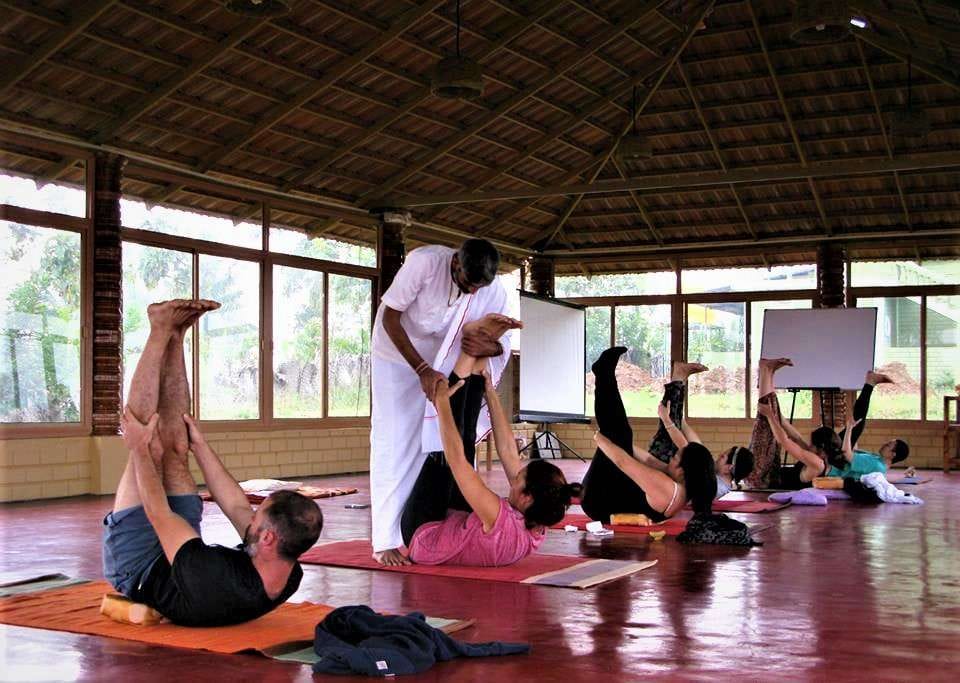 2. Teaching Methodology – This is a combination of complex topics such as Designing Yoga class for women, How to teach different practices of Yoga, How to be good Yoga teacher, Ethical guidelines, Develop communication skills, Time management, Principles of demonstration, Assistance, Awareness, Correction, Styles of teaching, Specific needs of children in a Yoga class and Business aspects of Yoga for women etc.
2. Teaching Methodology – This is a combination of complex topics such as Designing Yoga class for women, How to teach different practices of Yoga, How to be good Yoga teacher, Ethical guidelines, Develop communication skills, Time management, Principles of demonstration, Assistance, Awareness, Correction, Styles of teaching, Specific needs of children in a Yoga class and Business aspects of Yoga for women etc.
3. Anatomy and Physiology –
(a) Modern human anatomy and physiology – Skeleton System, Muscular System, Respiratory System, Endocrine System, Reproductive System and Nervous System.
(b) Yoga human anatomy and physiology – Human body according to Yoga and their relation to the study of human body in modern study (Discussion on 3 Bodies, 5 elements, 5 Kosha, Nadi, Chakra and Kundalini).
(c) Holistic approach of Yoga – Learning how system of Yoga needs to be incorporated to women to affect the internal organs for substantial growth and development.
4. Yoga Philosophy, Lifestyle and Ethics for Yoga Teachers – Overview of description of the term Philosophy, Yoga, Way of living, True sense of the term “religion”, Little reflection on the life story of great Gurus of different parts of the world, Womanhood, Women’s health and hygiene, Motherhood, How to look after children according to Yogic Lifestyle, Ethics for a Yoga Teacher for women, Stories of some great women of the world, Ethical guidelines as an individual and as a Yoga teacher.
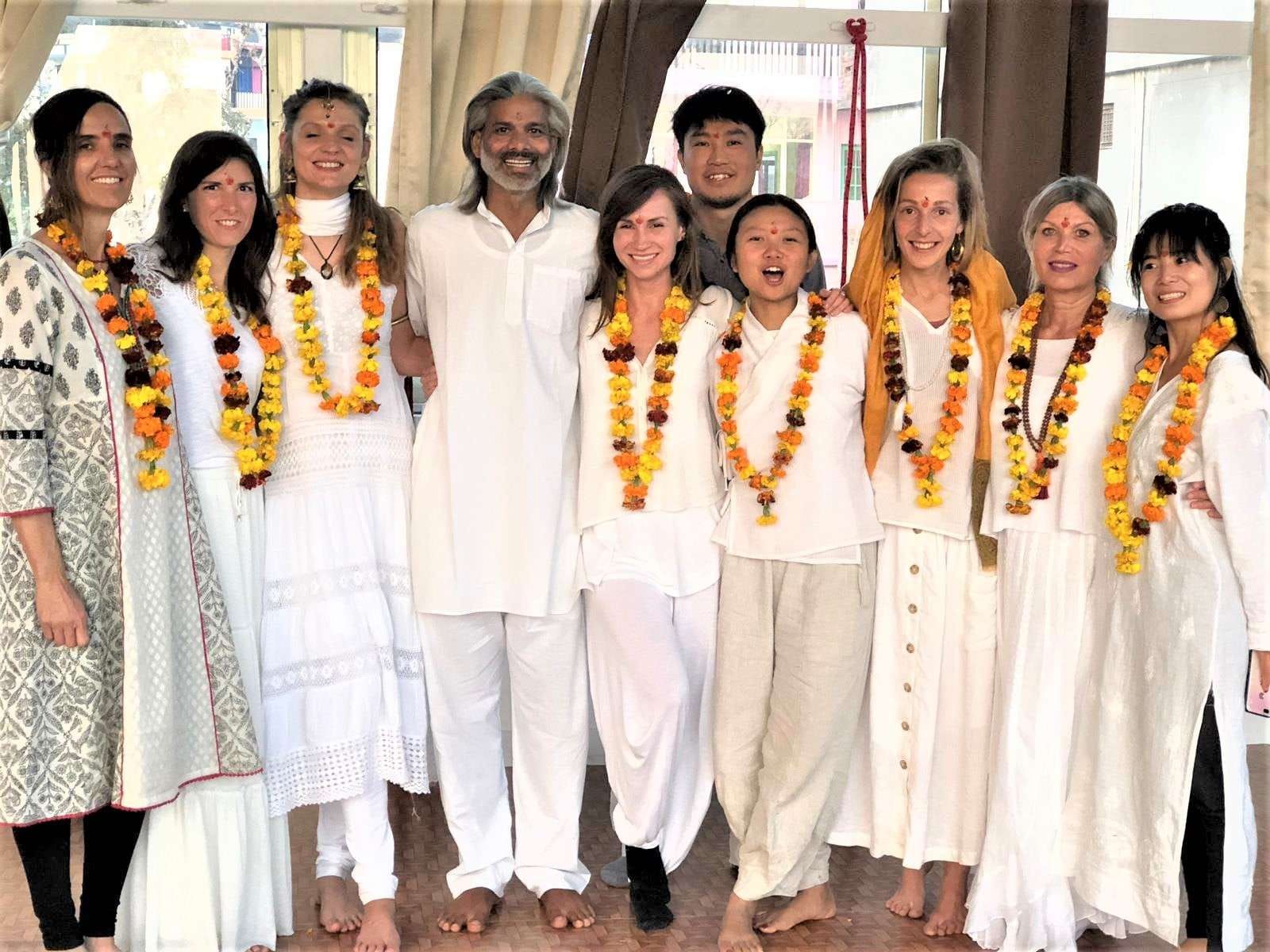 5. Practicum – Practice of teaching in groups as the lead instructor, Observe and assist while others teaching, Focus on specific practices and Compiling feedback etc.
5. Practicum – Practice of teaching in groups as the lead instructor, Observe and assist while others teaching, Focus on specific practices and Compiling feedback etc.
Suggested Yoga Books for 100 Hours Women Yoga Training Retreat –
Nawa Yogini Tantra – Swami Satyananda Saraswati
Yoga and Pregnancy – Swami Nirmalananda Saraswati
Asana Pranayama Mudra Bandha – Swami Satyananda Saraswati
Anatomy and Physiology – Not specified
 100 Hours Children Yoga Training Retreat in Rishikesh India incorporates several topics which helps one to understand and know the Yogic culture for children. They are –
100 Hours Children Yoga Training Retreat in Rishikesh India incorporates several topics which helps one to understand and know the Yogic culture for children. They are –
1. Techniques, Training, Practice –
Hatha Yoga Asana – Different postures of Hatha Yoga such as such as preparatory movements of joints, muscles and parts of body properly designed and very important for children such as Standing, Supine, Prone – (backward, forward, spine twist), Inversion only for children of certain age group and Balance.
Pranayama – Udar Svashan, Vaksha Svashan, Griva Svashan, Yogic Svashan, Nadi Shodhana, Bhramari and Ujjayi according to the proper norms designed for children.
Mudra – Basic gesture of hands, fingers and body for children to affect energy in body.
Satkarma – Practices for purification of body in Yoga (Jala Neti and others only if required for children of certain age group).
Meditation – All forms of practices in a proper scheme suited for children such as Fundamental practices of Yoga Nidra for children, Yogic breathing with awareness, Fundamental practices of developing awareness, Kaya asthairyam (stillness of body), Awareness of natural breath, Special practices of meditation for children and Developing awareness with mantra such as AUM.
Karma Yoga – During the retreat individuals would be required those to participate in Karma Yoga. Depending upon the requirements we may involve you into this.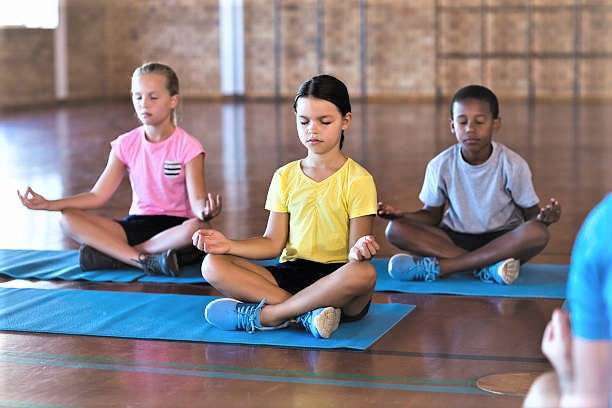
2. Teaching Methodology – This is a combination of complex topics such as Designing Yoga class for children, How to teach different practices of Yoga, How to be good Yoga teacher, Ethical guidelines, Develop communication skills, Time management, Principles of demonstration, Assistance, Awareness, Correction, Styles of teaching, Specific needs of children in a Yoga class and Business aspects of Yoga for children etc.
3. Anatomy and Physiology –
(a) Modern human anatomy and physiology – Skeleton System, Muscular System, Respiratory System, Endocrine System and Nervous System.
(b) Yoga human anatomy and physiology – Short discussion on composition of Human body according to Yoga and their relation to the study of human body in modern study, Discussion on 3 Bodies, 5 Elements, 5 Kosha, 5 Sense organs and 5 Motor organs, Nadi, Chakra and Kundalini.
(c) Holistic approach of Yoga – Learning how system of Yoga needs to be incorporated to children to affect the internal organs for substantial growth and development of children.
4. Yoga Philosophy, Lifestyle and Ethics for Yoga Teachers – Overview of description of the term Philosophy, Yoga, Way of living, Little reflection on the life story of great Gurus of different parts of the world, Parenthood, Talks regarding how to look after children according to Yogic Lifestyle, Child psychology, Ethics for a Children Yoga Teacher and Ethical guidelines as an individual and as a Yoga teacher.
5. Practicum – Practice of teaching different practices in groups as the lead instructor, Observe and assist while others teaching, Focus on specific practices and Compiling feedback etc.
Suggested Yoga Books for 100 Hours Children Yoga Training Retreat –
Yoga Education for Children (Volume 1) – Swami Satyananda Saraswati
Yoga Education for Children (Volume 2) – Swami Niranjananda Saraswati
Asana Pranayama Mudra Bandha – Swami Satyananda Saraswati
Anatomy and Physiology – Not specified
 The scheme of study – The retreat combines theoretical as well as practical aspects of Yoga as to how they are helpful to improve our physical, mental, emotional and spiritual health. The curriculum combines important topics of Yoga, guidelines based on lifestyle and information on application of Yoga on health issues.
The scheme of study – The retreat combines theoretical as well as practical aspects of Yoga as to how they are helpful to improve our physical, mental, emotional and spiritual health. The curriculum combines important topics of Yoga, guidelines based on lifestyle and information on application of Yoga on health issues.
Important theoretical study – Philosophy of Yoga and its meaning, Aims of Yoga, Sristi (Uinverse) according to Yoga, Human body (3 Bodies, 5 elements, 5 Kosha, Prana, Mind, 5 Sense organs and 5 Motor organs, Nadi, Chakra and Kundalini), Selected topics from Yoga Sutra to understand Yoga psychology (Antahakaran, Chitta, Antarayah, Ishwara, Aum, 5 Kleshas and 8 limbs), How to use Yoga practices on certain health conditions, Brief study regarding how to design the Yoga practices, How to practice, Ethical guidelines and Life style.
Important practices – The main practices come from Hatha Yoga which are blended with practices from Kriya Yoga, Kundalini Yoga and Raja Yoga. They are –
Asana – Postures of Hatha Yoga such as preparatory movements of joints, muscles and parts of body, Standing, Supine, Prone – (backward, forward, spine twist), Inversion and Balance including those asana which are remedial in nature at their intermediate level.
 Pranayama – Udar Svashan, Vaksha Svashan, Griva Svashan, Yogic Svashan, Kapalabhati, Bhastrika, Nadi Shodhana, Bhramari and Ujjayi.
Pranayama – Udar Svashan, Vaksha Svashan, Griva Svashan, Yogic Svashan, Kapalabhati, Bhastrika, Nadi Shodhana, Bhramari and Ujjayi.
Mudra – Gesture of hands, fingers and body to affect energy in body.
Bandha – Practices of locking the energy in body.
Satkarma – Practices for purification of body in Yoga (Jala Neti).
Meditation – Fundamental practices of Yoga Nidra, Yogic breathing with awareness, Fundamental practices of developing awareness, Kaya asthairyam (stillness of body), Awareness of natural breath, Awareness of peace, Antarmouna (inner silence) with awareness of natural sensory responses and awareness of natural thought process, Developing awareness with mantra such as AUM and other Relevant practices of meditation for healing.
Attention – Every retreat is with people from different situation so there is always a requirement for change in the program mentioned here.
Relevant Yoga Books for Yoga Therapy Training Retreat –

Asana Pranayama Mudra Bandha – Swami Satyananda Saraswati
Yoga Class Curriculum
 Yoga Retreat in Rishikesh India incorporates several topics which helps one to enter into Yogic culture. They are –
Yoga Retreat in Rishikesh India incorporates several topics which helps one to enter into Yogic culture. They are –
Hatha Yoga Asana – Different basic postures of Hatha Yoga such as such as preparatory movements of joints, muscles and parts of body, Standing, Supine, Prone – (backward, forward, spine twist), Inversion and Balance.
Pranayama – Udar Svashan, Vaksha Svashan, Griva Svashan, Yogic Svashan, Kapalabhati, Nadi Shodhana, Bhramari and Ujjayi.
Mudra – Basic gesture of hands, fingers and body to affect energy in body.
Satkarma – Practices for purification of body in Yoga (Jala Neti).
Meditation – Fundamental practices of Yoga Nidra, Yogic breathing with awareness, Fundamental practices of developing awareness, Kaya asthairyam (stillness of body), Awareness of natural breath, Awareness of peace and Developing awareness with mantra such as AUM.
Some other important topics – How to do different practices of Yoga, How to make a Yoga program, Ethical guidelines, Human anatomy, Teaching methodology, Yogic life style and Holistic approach of Yoga.
Karma Yoga – During the retreat individuals would be required those to participate into Karma Yoga. Depending upon the requirements we may involve you into this.
 Suggested Yoga Books for Yoga Retreat –
Suggested Yoga Books for Yoga Retreat –
Asana Pranayama Mudra Bandha – Swami Satyananda Saraswati
Raja Yoga – Swami Vivekananda or
Four Chapters on freedom – Swami Satyananda Saraswati
Anatomy and Physiology – Not specified
 Meditation Retreat in Rishikesh India incorporates several topics which helps one to enter into Yogic culture of meditation. They are –
Meditation Retreat in Rishikesh India incorporates several topics which helps one to enter into Yogic culture of meditation. They are –
Hatha Yoga Asana – Different basic postures of Hatha Yoga such as such as preparatory movements of joints, muscles and parts of body, Standing, Supine, Prone – (backward, forward and spine twist), Inversion and Balance, specific Asana helpful for relaxation and meditation such as Shavasana, Sukhasana, Ardha Padmasana, Padmasana, Siddhasana, Siddha Yoni Asana, Swastikasana, Dhyana Veerasana, Vajrasana and Padadhirasana etc.
Pranayama – Udar Svashan, Vaksha Svashan, Griva Svashan, Yogic Svashan, Nadi Shodhana, Bhramari and Ujjayi with special method which helps towards meditation.
Mudra – Some basic gesture of fingers and body to affect energy in body such as – Jnana, China, Bhirava & Bhairavi etc.
Satkarma – Practices for purification of body in Yoga (Jala Neti).
Meditation – Fundamental practices of Yoga Nidra, Yogic breathing with awareness, Fundamental practices of developing awareness, Kaya asthairyam (stillness of body), Awareness of natural breath, Awareness of peace, Bhao aaropan (Awareness of feelings), Developing awareness with mantra such as AUM, Sharir darshan (Body awareness), Awareness of certain symbols, Chakra Awareness and Atmanubhav (Self-awareness).
Lecture on Some important topics – How to do different practices of Yoga, How to make program, Ethical guidelines, Yogic life style and Holistic approach of Yoga.
Karma Yoga – During the retreat individuals would be required those to participate into Karma Yoga. Depending upon the requirements we may involve you into this.

Suggested Yoga Books for Meditation Retreat –
Asana Pranayama Mudra Bandha – Swami Satyananda Saraswati
Raja Yoga – Swami Vivekananda or
Four Chapters on Freedom – Swami Satyananda Saraswati
Yoga Darshan – Swami Niranjanananda Saraswati
Anatomy and Physiology – Not specified
 Class - Asana, Pranayama, Meditation and relevant Yoga classes. We offer Online Yoga classes on VOLUNTARY PAYMENT BASIS as well. For this individuals can make a prior request. For the request please follow Logistics.
Class - Asana, Pranayama, Meditation and relevant Yoga classes. We offer Online Yoga classes on VOLUNTARY PAYMENT BASIS as well. For this individuals can make a prior request. For the request please follow Logistics.
A. Daily (drop-in) Yoga Class – Asana, Pranayama and Relaxation.
Duration – Minimum 60 minutes and maximum up to 90 minutes according to the need.
B. Special Yoga Class – Asana, Pranayama, Mudra, Bandha, Shat-karma, Meditation, Tantra, Kundalini, Chakra, 3 Nadis, Tantra for couples, Swara Yoga, Prana Vidya (ancient energy healing), Reiki, Yoga Nidra (commonly called Nidra Yoga) and Yoga Cleansing etc.
- 15 Hours Hatha Asana Training with Certification – Theory, practical and proper guidelines.
- 15 Hours Kundalini Asana Training with Certification – Theory, practical and proper guidelines.
- 15 Hours Pranayama Training with Certification – Theory, practical and proper guidelines.
- 15 Hours Yoga Nidra Training with Certification – Theory, practical and proper guidelines.
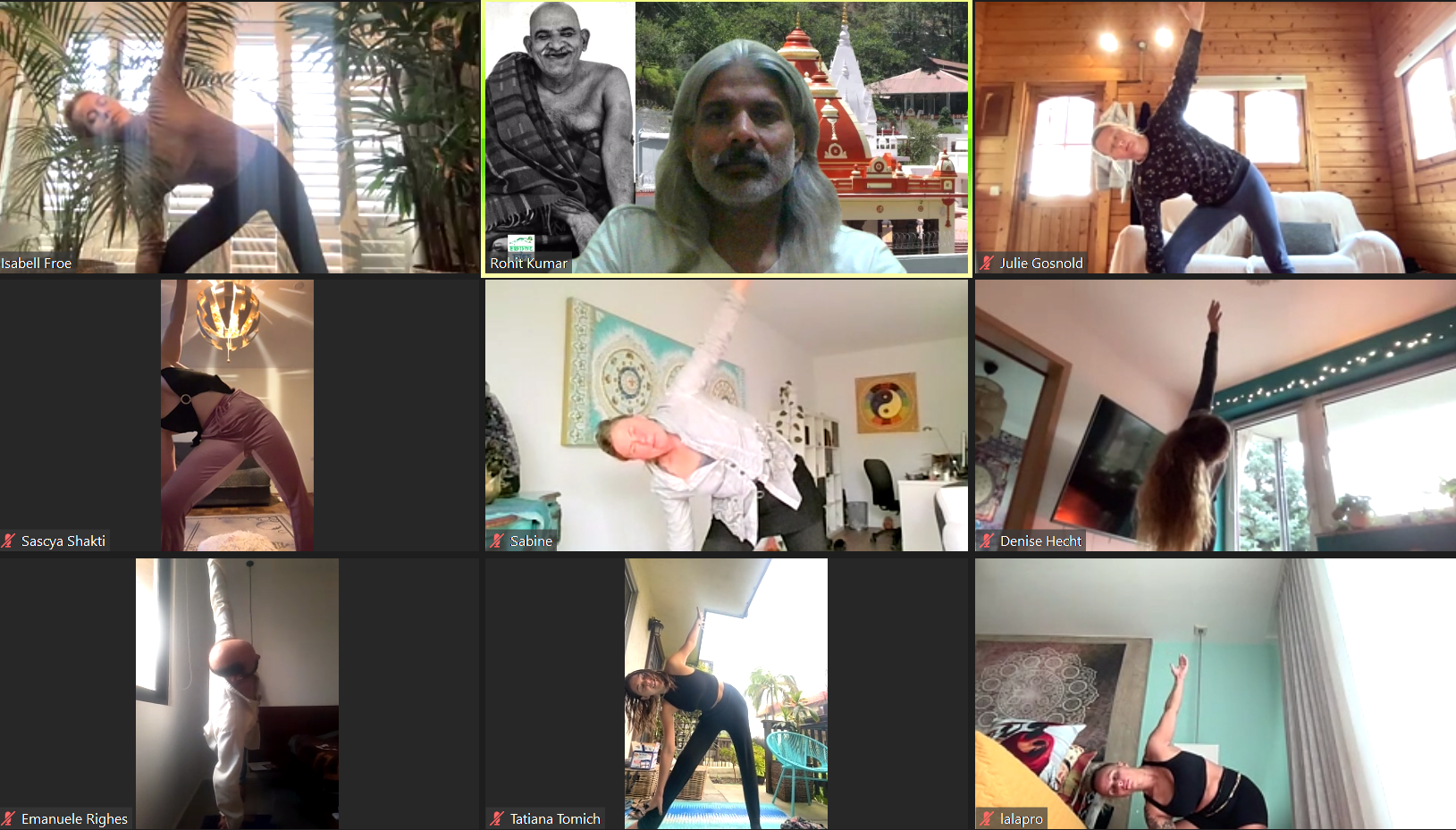
- 15 Hours Prana Vidya Training with Certification – Theory, practical and proper guidelines.
- 15 Hours Chakra Training with Certification – Theory, practical and proper guidelines.
- Yoga Workshop – Kundalini, Kriya, Tantra for couples, Yoga Nidra, Chakra meditation and special meditation etc. practices.
- Yoga Therapy – for health purposes.
- Study of Scriptures, life and Philosophy (Darshan) – for spiritual aspirants.
- Yoga Counselling – for health and well-being.
Duration – 3 days, 7 days, 10 days etc. (One session minimum 60 minutes and maximum up to 90 minutes).
Attention – The Yoga classes are to be modified as well according to the need of people. Therefore if anyone has any special requirements please do mention following which the required Yoga class can be organized.
Counselling – Counselling means conversation with/listening to an individual or group of individuals in need of physical, mental, emotional and psychic needs and providing her/him/them right theoretical and practical guidelines according to various Yogic disciplines.
Yogic discipline explained – It includes Tantric and Yogic practices, observance of silence, fasting as suggested, prescribed food and more importantly considerable change in daily life style.
How do we do – The counselling is done mostly on an individual basis but if required it is also done to a group of individuals who share some common interests. This service is done on prior request only.
How does this work -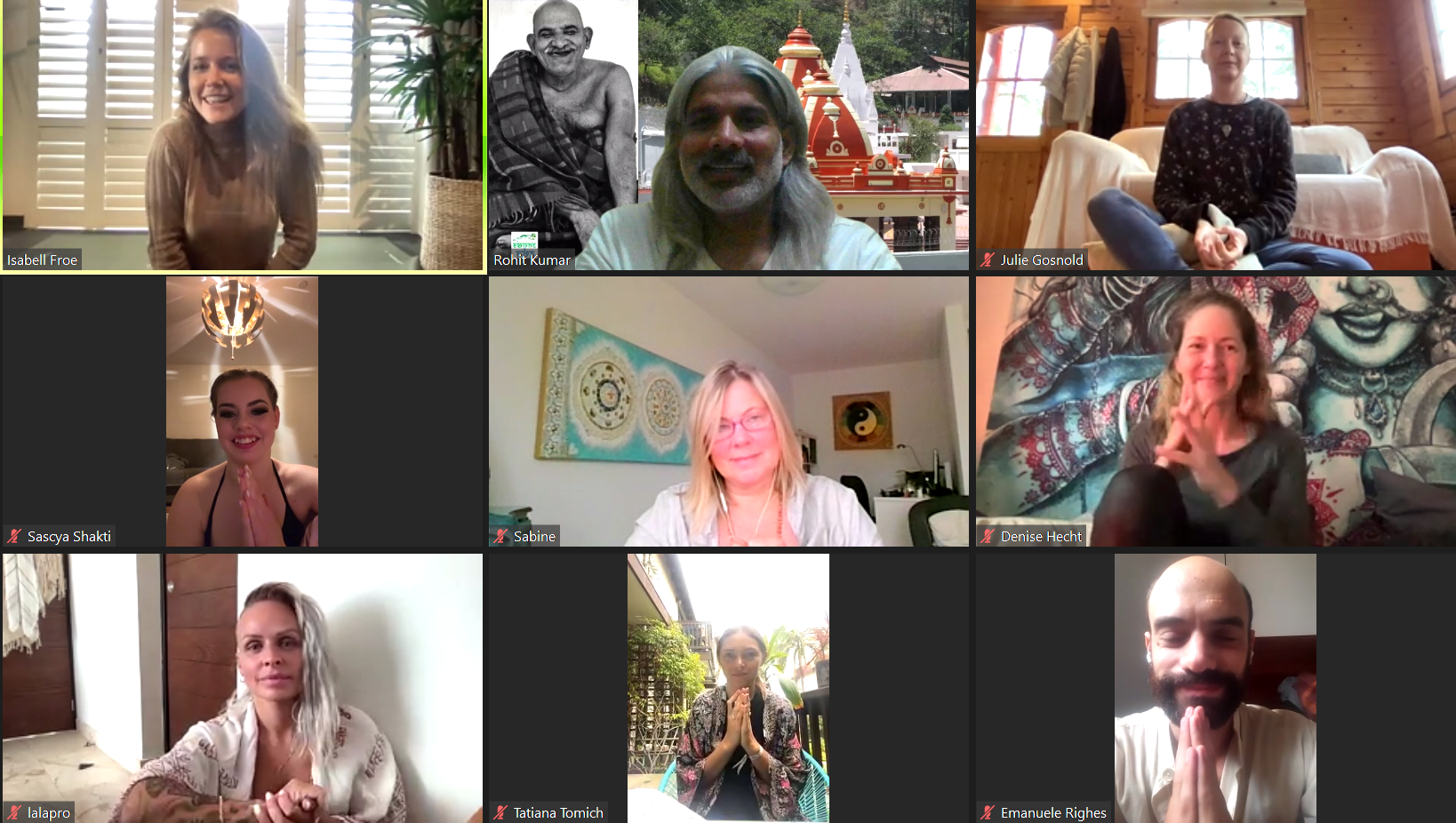
- During counselling, he/she unearths the issues in detail so that proper findings can be arrived at and accordingly a compact program can be made which he/she needs to continue according to the disciplines set for him/her.
- Rohit Kumar is there and you can share to him what you want to. He listens to you through, suggests the required and puts you into a safer domain where you find answers from within yourself. You are always free to ask questions interactively as much and as many.
Duration - 1 hour maximum (nevertheless the counselling may be stretched beyond if needed).
Instructor to Online Yoga Counselling - Yogabhyasi (Yoga Practitioner) Rohit Kumar.
 Yoga class fee structure - Regarding fee, Overseas means people living/working outside India, NRI means Non-resident Indians living/working outside India and Indian means people living/working in India. Hereunder are the Online Yoga Class Fee (excluding transfer charges/commissions) -
Yoga class fee structure - Regarding fee, Overseas means people living/working outside India, NRI means Non-resident Indians living/working outside India and Indian means people living/working in India. Hereunder are the Online Yoga Class Fee (excluding transfer charges/commissions) -
A. Daily Yoga (drop-in) - 1000/- Indian rupees only per session for International, NRI and 500/- INR only per session for Indians.
B. Special Yoga Class (with Rohit Kumar) -
- Yoga Class (drop-in) - 2100/- Indian rupees only per session for International, NRI and 1000/- INR only per session for Indians.
- 15 Hours Hatha Asana Training with Certification – 31500/- Indian rupees only for International, NRI and 15000/- INR only for Indians.
- 15 Hours Kundalini Asana Training with Certification – 31500/- Indian rupees only for International, NRI and 15000/- INR only for Indians.
- 15 Hours Pranayama Training with Certification – 31500/- Indian rupees only for International, NRI and 15000/- INR only for Indians.
- 15 Hours Yoga Nidra Training with Certification – 31500/- Indian rupees only for International, NRI and 15000/- INR only for Indians.
- 15 Hours Prana Vidya Training with Certification – 31500/- Indian rupees only for International, NRI and 15000/- INR only for Indians.
- 15 Hours Chakra Training with Certification – 31500/- Indian rupees only for International, NRI and 15000/- INR only for Indians.
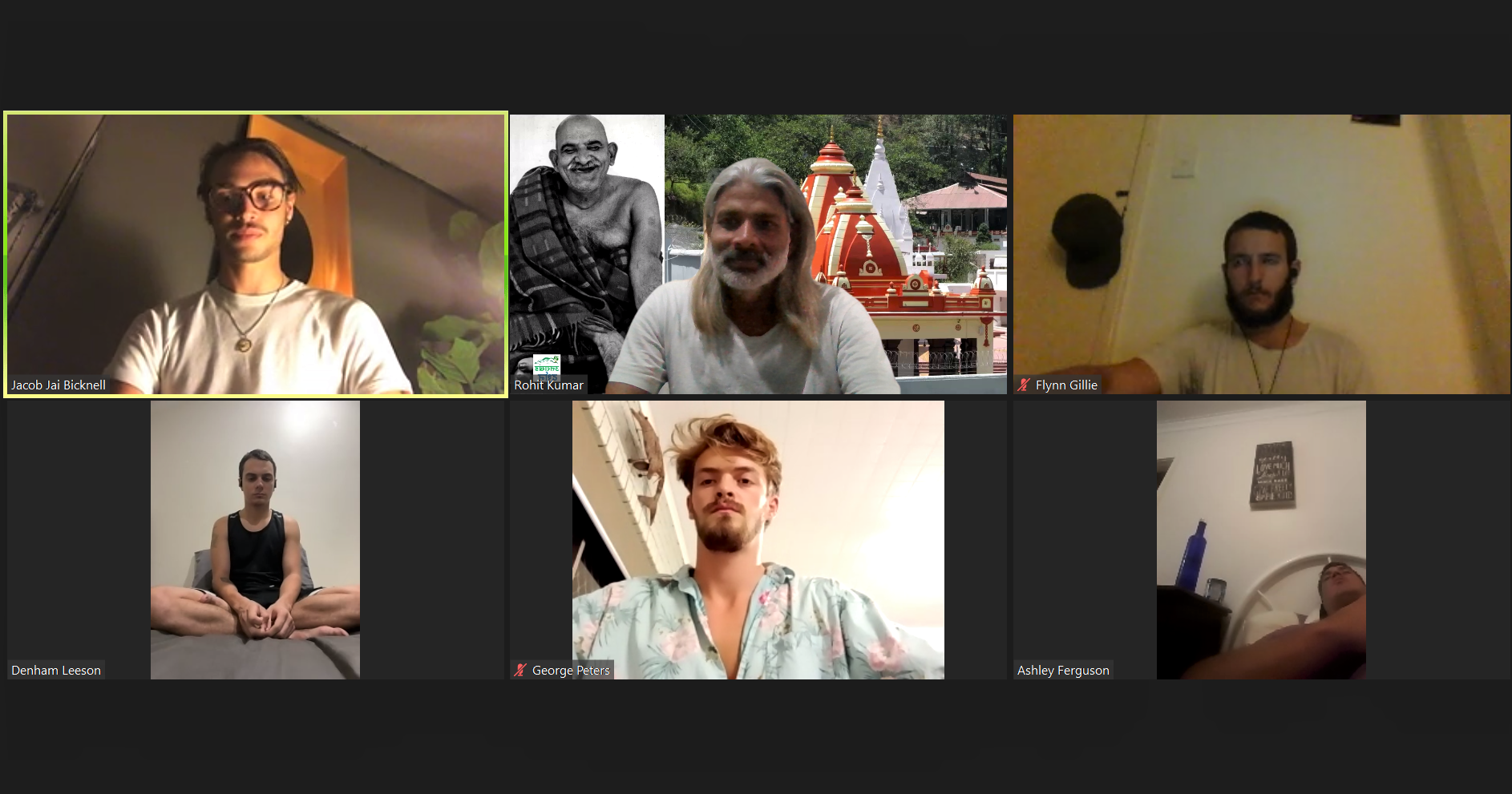 Yoga workshop - 5000/- Indian rupees only per session for International, NRI and 2500/- INR only per sessions for Indians..
Yoga workshop - 5000/- Indian rupees only per session for International, NRI and 2500/- INR only per sessions for Indians..- Yoga Therapy - 5000/- Indian rupees only per session for International, NRI and 2500/- INR only per session for Indians.
- Study of Scriptures, life and Philosophy (Darshan) - 2100/- Indian rupees only per session for International, NRI and 1100/- INR only per session for Indians.
- Yoga Counselling - 8000/- Indian rupees only per session for International, NRI and 4000/- INR only for Indians in the 1st counselling which includes conversation, counselling and required prescription.
*4000/- Indian rupees only for International, NRI (the same person) and 2000/- INR only for Indians (the same person) per 30 minutes from the 2nd counselling and onwards. The first 15 minutes of the first counselling is free for everybody. Then they can decide if they want to continue for counselling.
 Time Zone - In general we maintain the Indian Standard Time (IST) for all Yoga courses, retreats and classes. But the timings are subject to change according to the requirements. The live classes are done mostly 6 days in a week.
Time Zone - In general we maintain the Indian Standard Time (IST) for all Yoga courses, retreats and classes. But the timings are subject to change according to the requirements. The live classes are done mostly 6 days in a week.
Yoga Teacher Training Course (200, 300, 500 Hours) - Tentative time for all LIVE classes -
6.30am to 8am- Hatha Yoga Asana, Pranayama, Kriya and relevant practices.
8am to 9.30pm - Anatomy and Teaching methodology.
4.30pm to 6pm - Philosophy and Meditation.
Total live/contact and non-contact hours in Yoga teacher training course -
200 Hours Hatha YTTC - Contact Hours (live) - 91, Non-contact hours - 109 (includes self-study, assignments and videos)
300 Hours Hatha YTTC - Contact Hours (live) - 121, Non-contact hours - 179 (includes self-study, assignments and videos)
500 Hours Hatha YTTC - Contact Hours (live) - 211, Non-contact hours - 289 (includes self-study, assignments and videos)
300 Hours Kriya YTTC - Contact Hours (live) - 121, Non-contact hours - 179 (includes self-study, assignments and videos)
300 Hours Kundalini YTTC - Contact Hours (live) - 121, Non-contact hours - 179 (includes self-study, assignments and videos)
300 Hours Raja YTTC - Contact Hours (live) - 121, Non-contact hours - 179 (includes self-study, assignments and videos)
300 Hours Bhakti YTTC - Contact Hours (live) - 121, Non-contact hours - 179 (includes self-study, assignments and videos)
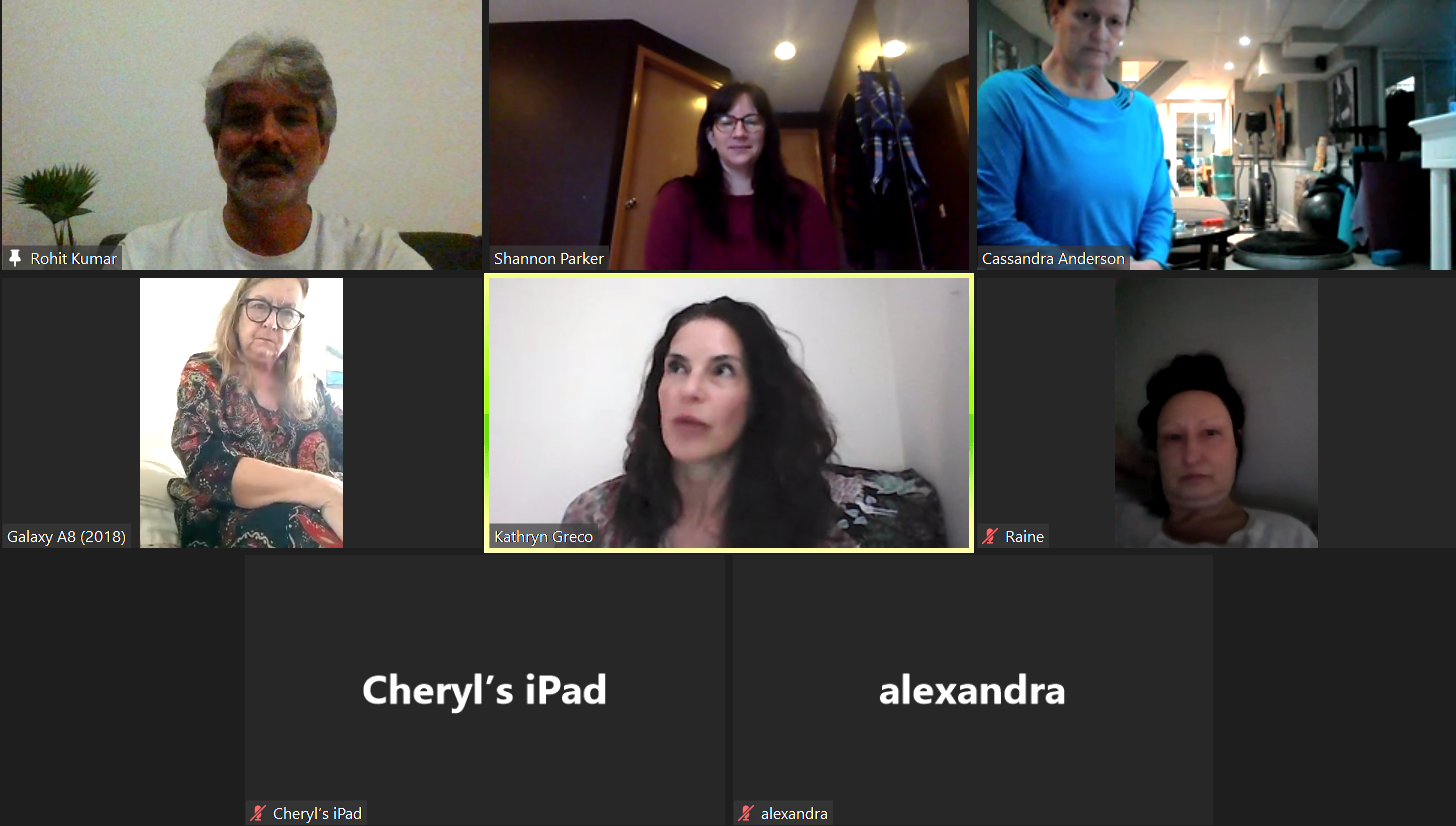 Yoga Retreat (10 days) - Tentative time for all LIVE classes -
Yoga Retreat (10 days) - Tentative time for all LIVE classes -
6.30am to 8am - Hatha Yoga and relevant practices.
4.30pm to 6pm - Philosophy and Meditation.
Meditation Retreat (7 days) - Tentative time for all LIVE classes -
6.30am to 8am - Hatha Yoga and relevant practices for meditation.
4.30pm to 6pm - Meditation and Philosophy.
Women Yoga Training Retreat (10 days) - Tentative time for all LIVE classes -
6.30am to 8am - Hatha Yoga and relevant practices.
4.30pm to 6pm - Philosophy, Anatomy, Teaching Methodology and Meditation.
Children Yoga Training Retreat (10 days) - Tentative time for all LIVE classes -
6.30am to 8am - Hatha Yoga and relevant practices.
 4.30pm to 6pm - Philosophy, Anatomy, Teaching Methodology and Meditation.
4.30pm to 6pm - Philosophy, Anatomy, Teaching Methodology and Meditation.
Yoga Therapy Training Retreat (21 days) - Tentative time for all LIVE classes -
6.30am to 8am - Hatha Yoga and relevant practices.
4.30pm to 6pm - Philosophy, Anatomy, Teaching Methodology and Meditation.
Yoga Classes - Tentative times for all kinds of LIVE classes -
Decided on individual basis upon the request made. The classes are 6 days in a week.
Yoga Teacher Training Course and Retreat - Please Register or write to the school via email - (sanatanayogsandesh@gmail.com) to check the availability. If the place is available we will request you to fill in the registration form online. Then you need to make non-refundable deposit to finally be selected for the course.
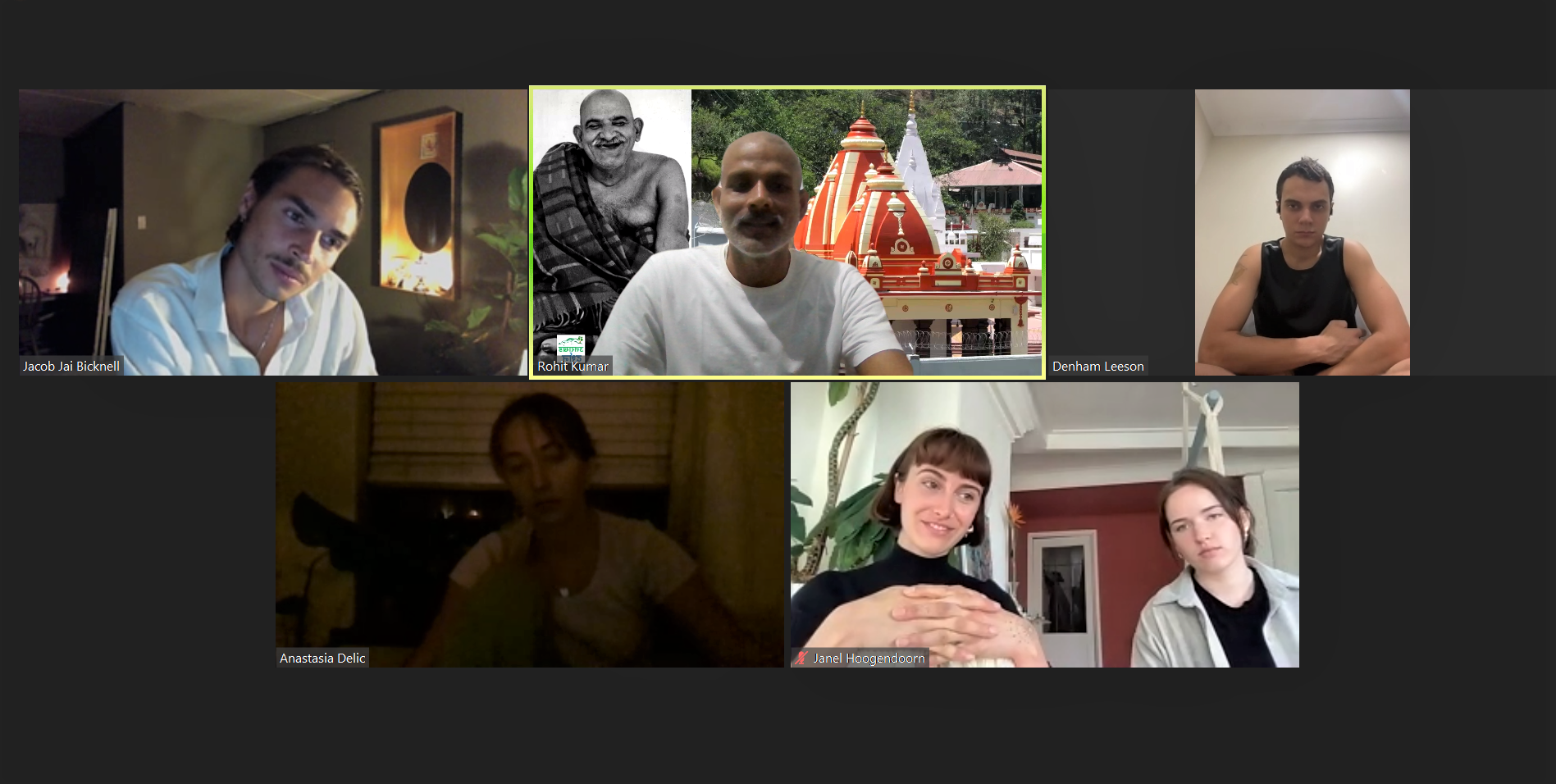 Yoga Class and Special Yoga class - Please Register or write to the founder Rohit Kumar at the email - ROHITRAMDIRI@YAHOO.IN or Whatsapp - +91-9472215331 or Skype - bhaktijnana2. He replies back shortly mentioning the other formalities.
Yoga Class and Special Yoga class - Please Register or write to the founder Rohit Kumar at the email - ROHITRAMDIRI@YAHOO.IN or Whatsapp - +91-9472215331 or Skype - bhaktijnana2. He replies back shortly mentioning the other formalities.
Deposit – For Yoga Teacher Training Courses/retreats/classes/therapy/study of scriptures/counselling, a non-refundable total amount of the program fee plus bank charges/commissions is required to confirm the registration in the concerned Online Yoga program. The students with financial limitation may request for payment in instalment or some relaxation in the prescribed fee. This is done on individual basis only after proper conversation about the detailed circumstances of the individual. To pay please follow Payment.
Cancellation of the registration - For the time being we do not provide this facility. Therefore, properly decide before you deposit the amount for the program.
200 Hours Online Hatha Yoga Teacher Training Course – 21 Days
| Date | Place | Hour | International Fee | Indian Fee | Status | Action |
| 01 Jan – 21 Jan | Rishikesh | 200 | 1100 Euro | 30000 INR | Open | Register |
| 01 Feb – 21 Feb | Rishikesh | 200 | 1100 Euro | 30000 INR | Open | Register |
| 01 Mar – 21 Mar | Rishikesh | 200 | 1100 Euro | 30000 INR | Open | Register |
| 01 Apr – 21 Apr | Rishikesh | 200 | 1100 Euro | 30000 INR | Open | Register |
| 01 May – 21 May | Rishikesh | 200 | 1100 Euro | 30000 INR | Open | Register |
| 01 Jun – 21 Jun | Rishikesh | 200 | 1100 Euro | 30000 INR | Open | Register |
| 01 Jul – 21 Jul | Rishikesh | 200 | 1100 Euro | 30000 INR | Open | Register |
| 01 Aug – 21 Aug | Rishikesh | 200 | 1100 Euro | 30000 INR | Open | Register |
| 01 Sep – 21 Sep | Rishikesh | 200 | 1100 Euro | 30000 INR | Open | Register |
| 01 Oct – 21 Oct | Rishikesh | 200 | 1100 Euro | 30000 INR | Open | Register |
| 01 Nov – 21 Nov | Rishikesh | 200 | 1100 Euro | 30000 INR | Open | Register |
| 01 Dec – 21 Dec | Rishikesh | 200 | 1100 Euro | 30000 INR | Open | Register |
300 Hours Online Hatha Yoga Teacher Training Course – 28 Days
| Date | Place | Hour | International Fee | Indian Fee | Status | Action |
| 01 Jan – 28 Jan | Rishikesh | 300 | 1400 Euro | 40000 INR | Open | Register |
| 01 Feb – 28 Feb | Rishikesh | 300 | 1400 Euro | 40000 INR | Open | Register |
| 01 Mar – 28 Mar | Rishikesh | 300 | 1400 Euro | 40000 INR | Open | Register |
| 01 Apr – 28 Apr | Rishikesh | 300 | 1400 Euro | 40000 INR | Open | Register |
| 01 May – 28 May | Rishikesh | 300 | 1400 Euro | 40000 INR | Open | Register |
| 01 Jun – 28 Jun | Rishikesh | 300 | 1400 Euro | 40000 INR | Open | Register |
| 01 Jul – 28 Jul | Rishikesh | 300 | 1400 Euro | 40000 INR | Open | Register |
| 01 Aug – 28 Aug | Rishikesh | 300 | 1400 Euro | 40000 INR | Open | Register |
| 01 Sep – 28 Sep | Rishikesh | 300 | 1400 Euro | 40000 INR | Open | Register |
| 01 Oct – 28 Oct | Rishikesh | 300 | 1400 Euro | 40000 INR | Open | Register |
| 01 Nov – 28 Nov | Rishikesh | 300 | 1400 Euro | 40000 INR | Open | Register |
| 01 Dec – 28 Dec | Rishikesh | 300 | 1400 Euro | 40000 INR | Open | Register |
500 Hours Online Hatha Yoga Teacher Training Course – 49 Days
| Date | Place | Hour | International Fee | Indian Fee | Status | Action |
| 01 Jan – 18 Feb | Rishikesh | 500 | 2300 Euro | 70000 INR | Register | |
| 01 Mar – 19 Apr | Rishikesh | 500 | 2300 Euro | 70000 INR | Register | |
| 01 May – 19 Jun | Rishikesh | 500 | 2300 Euro | 70000 INR | Register | |
| 01 Jul – 18 Aug | Rishikesh | 500 | 2300 Euro | 70000 INR | Register | |
| 01 Sep – 19 Oct | Rishikesh | 500 | 2300 Euro | 70000 INR | Register | |
| 01 Nov – 19 Dec | Rishikesh | 500 | 2300 Euro | 70000 INR | Register |
300 Hours Online Kriya Yoga Teacher Training Course – 28 Days
| Date | Place | Hour | International Fee | Indian Fee | Status | Action |
| 01 Jan – 28 Jan | Rishikesh | 300 | 1700 Euro | 60000 INR | Register | |
| 01 Feb – 28 Feb | Rishikesh | 300 | 1700 Euro | 60000 INR | Register | |
| 01 Mar – 28 Mar | Rishikesh | 300 | 1700 Euro | 60000 INR | Register | |
| 01 Apr – 28 Apr | Rishikesh | 300 | 1700 Euro | 60000 INR | Register | |
| 01 May – 28 May | Rishikesh | 300 | 1700 Euro | 60000 INR | Register | |
| 01 Jun – 28 Jun | Rishikesh | 300 | 1700 Euro | 60000 INR | Register | |
| 01 Jul – 28 Jul | Rishikesh | 300 | 1700 Euro | 60000 INR | Register | |
| 01 Aug – 28 Aug | Rishikesh | 300 | 1700 Euro | 60000 INR | Register | |
| 01 Sep – 28 Sep | Rishikesh | 300 | 1700 Euro | 60000 INR | Register | |
| 01 Oct – 28 Oct | Rishikesh | 300 | 1700 Euro | 60000 INR | Register | |
| 01 Nov – 28 Nov | Rishikesh | 300 | 1700 Euro | 60000 INR | Register | |
| 01 Dec – 28 Dec | Rishikesh | 300 | 1700 Euro | 60000 INR | Register |
300 Hours Online Kundalini Yoga Teacher Training Course – 28 Days
| Date | Place | Hour | International Fee | Indian Fee | Status | Action |
| 01 Jan – 28 Jan | Rishikesh | 300 | 1700 Euro | 60000 INR | Register | |
| 01 Feb – 28 Feb | Rishikesh | 300 | 1700 Euro | 60000 INR | Register | |
| 01 Mar – 28 Mar | Rishikesh | 300 | 1700 Euro | 60000 INR | Register | |
| 01 Apr – 28 Apr | Rishikesh | 300 | 1700 Euro | 60000 INR | Register | |
| 01 May – 28 May | Rishikesh | 300 | 1700 Euro | 60000 INR | Register | |
| 01 Jun – 28 Jun | Rishikesh | 300 | 1700 Euro | 60000 INR | Register | |
| 01 Jul – 28 Jul | Rishikesh | 300 | 1700 Euro | 60000 INR | Register | |
| 01 Aug – 28 Aug | Rishikesh | 300 | 1700 Euro | 60000 INR | Register | |
| 01 Sep – 28 Sep | Rishikesh | 300 | 1700 Euro | 60000 INR | Register | |
| 01 Oct – 28 Oct | Rishikesh | 300 | 1700 Euro | 60000 INR | Register | |
| 01 Nov – 28 Nov | Rishikesh | 300 | 1700 Euro | 60000 INR | Register | |
| 01 Dec – 28 Dec | Rishikesh | 300 | 1700 Euro | 60000 INR | Register |
300 Hours Online Raja Yoga Teacher Training Course – 28 Days
| Date | Place | Hour | International Fee | Indian Fee | Status | Action |
| 01 Jan – 28 Jan | Rishikesh | 300 | 1700 Euro | 60000 INR | Register | |
| 01 Feb – 28 Feb | Rishikesh | 300 | 1700 Euro | 60000 INR | Register | |
| 01 Mar – 28 Mar | Rishikesh | 300 | 1700 Euro | 60000 INR | Register | |
| 01 Apr – 28 Apr | Rishikesh | 300 | 1700 Euro | 60000 INR | Register | |
| 01 May – 28 May | Rishikesh | 300 | 1700 Euro | 60000 INR | Register | |
| 01 Jun – 28 Jun | Rishikesh | 300 | 1700 Euro | 60000 INR | Register | |
| 01 Jul – 28 Jul | Rishikesh | 300 | 1700 Euro | 60000 INR | Register | |
| 01 Aug – 28 Aug | Rishikesh | 300 | 1700 Euro | 60000 INR | Register | |
| 01 Sep – 28 Sep | Rishikesh | 300 | 1700 Euro | 60000 INR | Register | |
| 01 Oct – 28 Oct | Rishikesh | 300 | 1700 Euro | 60000 INR | Register | |
| 01 Nov – 28 Nov | Rishikesh | 300 | 1700 Euro | 60000 INR | Register | |
| 01 Dec – 28 Dec | Rishikesh | 300 | 1700 Euro | 60000 INR | Register |
300 Hours Online Bhakti Yoga Teacher Training Course – 28 Days
| Date | Place | Hour | International Fee | Indian Fee | Status | Action |
| 01 Jan – 28 Jan | Rishikesh | 300 | 1700 Euro | 60000 INR | Register | |
| 01 Feb – 28 Feb | Rishikesh | 300 | 1700 Euro | 60000 INR | Register | |
| 01 Mar – 28 Mar | Rishikesh | 300 | 1700 Euro | 60000 INR | Register | |
| 01 Apr – 28 Apr | Rishikesh | 300 | 1700 Euro | 60000 INR | Register | |
| 01 May – 28 May | Rishikesh | 300 | 1700 Euro | 60000 INR | Register | |
| 01 Jun – 28 Jun | Rishikesh | 300 | 1700 Euro | 60000 INR | Register | |
| 01 Jul – 28 Jul | Rishikesh | 300 | 1700 Euro | 60000 INR | Register | |
| 01 Aug – 28 Aug | Rishikesh | 300 | 1700 Euro | 60000 INR | Register | |
| 01 Sep – 28 Sep | Rishikesh | 300 | 1700 Euro | 60000 INR | Register | |
| 01 Oct – 28 Oct | Rishikesh | 300 | 1700 Euro | 60000 INR | Register | |
| 01 Nov – 28 Nov | Rishikesh | 300 | 1700 Euro | 60000 INR | Register | |
| 01 Dec – 28 Dec | Rishikesh | 300 | 1700 Euro | 60000 INR | Register |
Online Yoga Retreat – 10 Days
| Date | Place | Days | International Fee | Indian Fee | Status | Action |
| 01 Jan – 10 Jan | Rishikesh | 10 | 600 Euro | 15000 INR | Open | Register |
| 11 Jan – 20 Jan | Rishikesh | 10 | 600 Euro | 15000 INR | Open | Register |
| 1 Feb – 10 Feb | Rishikesh | 10 | 600 Euro | 15000 INR | Open | Register |
| 11 Feb – 20 Feb | Rishikesh | 10 | 600 Euro | 15000 INR | Open | Register |
| 1 Mar – 10 Mar | Rishikesh | 10 | 600 Euro | 15000 INR | Open | Register |
| 11 Mar – 20 Mar | Rishikesh | 10 | 600 Euro | 15000 INR | Open | Register |
| 1 Apr – 10 Apr | Rishikesh | 10 | 600 Euro | 15000 INR | Open | Register |
| 11 Apr – 20 Apr | Rishikesh | 10 | 600 Euro | 15000 INR | Open | Register |
| 1 May – 10 May | Rishikesh | 10 | 600 Euro | 15000 INR | Open | Register |
| 11 May – 20 May | Rishikesh | 10 | 600 Euro | 15000 INR | Open | Register |
| 1 Jun – 10th Jun | Rishikesh | 10 | 600 Euro | 15000 INR | Open | Register |
| 11 Jun – 20th Jun | Rishikesh | 10 | 600 Euro | 15000 INR | Open | Register |
| 1 Jul – 10 Jul | Rishikesh | 10 | 600 Euro | 15000 INR | Open | Register |
| 11 Jul – 20 Jul | Rishikesh | 10 | 600 Euro | 15000 INR | Open | Register |
| 1 Aug – 10 Aug | Rishikesh | 10 | 600 Euro | 15000 INR | Open | Register |
| 11 Aug – 20 Aug | Rishikesh | 10 | 600 Euro | 15000 INR | Open | Register |
| 1 Sep – 10 Sep | Rishikesh | 10 | 600 Euro | 15000 INR | Open | Register |
| 11 Sep – 20 Sep | Rishikesh | 10 | 600 Euro | 15000 INR | Open | Register |
| 1 Oct – 10 Oct | Rishikesh | 10 | 600 Euro | 15000 INR | Open | Register |
| 11 Oct – 20 Oct | Rishikesh | 10 | 600 Euro | 15000 INR | Open | Register |
| 1 Nov – 10 Nov | Rishikesh | 10 | 600 Euro | 15000 INR | Open | Register |
| 11 Nov – 20 Nov | Rishikesh | 10 | 600 Euro | 15000 INR | Open | Register |
| 1 Dec – 10 Dec | Rishikesh | 10 | 600 Euro | 15000 INR | Open | Register |
| 11 Dec – 20 Dec | Rishikesh | 10 | 600 Euro | 15000 INR | Open | Register |
Online Meditation Retreat – 7 Days
| Date | Place | Days | International Fee | Indian Fee | Status | Action |
| 1 Jan – 7 Jan | Rishikesh | 7 | 400 Euro | 10000 INR | Open | Register |
| 11 Jan – 17 Jan | Rishikesh | 7 | 400 Euro | 10000 INR | Open | Register |
| 1 Feb – 7 Feb | Rishikesh | 7 | 400 Euro | 10000 INR | Open | Register |
| 11 Feb – 17 Feb | Rishikesh | 7 | 400 Euro | 10000 INR | Open | Register |
| 1 Mar – 7 Mar | Rishikesh | 7 | 400 Euro | 10000 INR | Open | Register |
| 11 Mar – 17 Mar | Rishikesh | 7 | 400 Euro | 10000 INR | Open | Register |
| 1 Apr – 7 Apr | Rishikesh | 7 | 400 Euro | 10000 INR | Open | Register |
| 11 Apr – 17 Apr | Rishikesh | 7 | 400 Euro | 10000 INR | Open | Register |
| 1 May – 7 May | Rishikesh | 7 | 400 Euro | 10000 INR | Open | Register |
| 11 May – 17 May | Rishikesh | 7 | 400 Euro | 10000 INR | Open | Register |
| 1 Jun – 7 Jun | Rishikesh | 7 | 400 Euro | 10000 INR | Open | Register |
| 11 Jun – 17 Jun | Rishikesh | 7 | 400 Euro | 10000 INR | Open | Register |
| 1 Jul – 7 July | Rishikesh | 7 | 400 Euro | 10000 INR | Open | Register |
| 11 Jul – 17 Jul | Rishikesh | 7 | 400 Euro | 10000 INR | Open | Register |
| 1 Aug – 7 Aug | Rishikesh | 7 | 400 Euro | 10000 INR | Open | Register |
| 11 Aug – 17 Aug | Rishikesh | 7 | 400 Euro | 10000 INR | Open | Register |
| 1 Sep – 7 Sep | Rishikesh | 7 | 400 Euro | 10000 INR | Open | Register |
| 11 Sept – 17 Sep | Rishikesh | 7 | 400 Euro | 10000 INR | Open | Register |
| 1 Oct – 7 Oct | Rishikesh | 7 | 400 Euro | 10000 INR | Open | Register |
| 11 Oct – 17 Oct | Rishikesh | 7 | 400 Euro | 10000 INR | Open | Register |
| 1 Nov – 7 Nov | Rishikesh | 7 | 400 Euro | 10000 INR | Open | Register |
| 11 Nov – 17 Nov | Rishikesh | 7 | 400 Euro | 10000 INR | Open | Register |
| 1 Dec – 7 Dec | Rishikesh | 7 | 400 Euro | 10000 INR | Open | Register |
| 11 Dec – 17 Dec | Rishikesh | 7 | 400 Euro | 10000 INR | Open | Register |
Online Women Yoga Training Retreat – 10 Days
| Date | Place | Days | International Fee | Indian Fee | Status | Action |
| 01 Jan – 10 Jan | Rishikesh | 10 | 700 Euro | 20000 INR | Register | |
| 11 Jan – 20 Jan | Rishikesh | 10 | 700 Euro | 20000 INR | Register | |
| 1 Feb – 10 Feb | Rishikesh | 10 | 700 Euro | 20000 INR | Register | |
| 11 Feb – 20 Feb | Rishikesh | 10 | 700 Euro | 20000 INR | Register | |
| 1 Mar – 10 Mar | Rishikesh | 10 | 700 Euro | 20000 INR | Register | |
| 11 Mar – 20 Mar | Rishikesh | 10 | 700 Euro | 20000 INR | Register | |
| 1 Apr – 10 Apr | Rishikesh | 10 | 700 Euro | 20000 INR | Register | |
| 11 Apr – 20 Apr | Rishikesh | 10 | 700 Euro | 20000 INR | Register | |
| 1 May – 10 May | Rishikesh | 10 | 700 Euro | 20000 INR | Register | |
| 11 May – 20 May | Rishikesh | 10 | 700 Euro | 20000 INR | Register | |
| 1 Jun – 10th Jun | Rishikesh | 10 | 700 Euro | 20000 INR | Register | |
| 11 Jun – 20th Jun | Rishikesh | 10 | 700 Euro | 20000 INR | Register | |
| 1 Jul – 10 Jul | Rishikesh | 10 | 700 Euro | 20000 INR | Register | |
| 11 Jul – 20 Jul | Rishikesh | 10 | 700 Euro | 20000 INR | Register | |
| 1 Aug – 10 Aug | Rishikesh | 10 | 700 Euro | 20000 INR | Register | |
| 11 Aug – 20 Aug | Rishikesh | 10 | 700 Euro | 20000 INR | Register | |
| 1 Sep – 10 Sep | Rishikesh | 10 | 700 Euro | 20000 INR | Register | |
| 11 Sep – 20 Sep | Rishikesh | 10 | 700 Euro | 20000 INR | Register | |
| 1 Oct – 10 Oct | Rishikesh | 10 | 700 Euro | 20000 INR | Register | |
| 11 Oct – 20 Oct | Rishikesh | 10 | 700 Euro | 20000 INR | Register | |
| 1 Nov – 10 Nov | Rishikesh | 10 | 700 Euro | 20000 INR | Register | |
| 11 Nov – 20 Nov | Rishikesh | 10 | 700 Euro | 20000 INR | Register | |
| 1 Dec – 10 Dec | Rishikesh | 10 | 700 Euro | 20000 INR | Register | |
| 11 Dec – 20 Dec | Rishikesh | 10 | 700 Euro | 20000 INR | Register |
Online Children Yoga Training Retreat – 10 Days
| Date | Place | Days | International Fee | Indian Fee | Status | Action |
| 01 Jan – 10 Jan | Rishikesh | 10 | 700 Euro | 20000 INR | Register | |
| 11 Jan – 20 Jan | Rishikesh | 10 | 700 Euro | 20000 INR | Register | |
| 1 Feb – 10 Feb | Rishikesh | 10 | 700 Euro | 20000 INR | Register | |
| 11 Feb – 20 Feb | Rishikesh | 10 | 700 Euro | 20000 INR | Register | |
| 1 Mar – 10 Mar | Rishikesh | 10 | 700 Euro | 20000 INR | Register | |
| 11 Mar – 20 Mar | Rishikesh | 10 | 700 Euro | 20000 INR | Register | |
| 1 Apr – 10 Apr | Rishikesh | 10 | 700 Euro | 20000 INR | Register | |
| 11 Apr – 20 Apr | Rishikesh | 10 | 700 Euro | 20000 INR | Register | |
| 1 May – 10 May | Rishikesh | 10 | 700 Euro | 20000 INR | Register | |
| 11 May – 20 May | Rishikesh | 10 | 700 Euro | 20000 INR | Register | |
| 1 Jun – 10th Jun | Rishikesh | 10 | 700 Euro | 20000 INR | Register | |
| 11 Jun – 20th Jun | Rishikesh | 10 | 700 Euro | 20000 INR | Register | |
| 1 Jul – 10 Jul | Rishikesh | 10 | 700 Euro | 20000 INR | Register | |
| 11 Jul – 20 Jul | Rishikesh | 10 | 700 Euro | 20000 INR | Register | |
| 1 Aug – 10 Aug | Rishikesh | 10 | 700 Euro | 20000 INR | Register | |
| 11 Aug – 20 Aug | Rishikesh | 10 | 700 Euro | 20000 INR | Register | |
| 1 Sep – 10 Sep | Rishikesh | 10 | 700 Euro | 20000 INR | Register | |
| 11 Sep – 20 Sep | Rishikesh | 10 | 700 Euro | 20000 INR | Register | |
| 1 Oct – 10 Oct | Rishikesh | 10 | 700 Euro | 20000 INR | Register | |
| 11 Oct – 20 Oct | Rishikesh | 10 | 700 Euro | 20000 INR | Register | |
| 1 Nov – 10 Nov | Rishikesh | 10 | 700 Euro | 20000 INR | Register | |
| 11 Nov – 20 Nov | Rishikesh | 10 | 700 Euro | 20000 INR | Register | |
| 1 Dec – 10 Dec | Rishikesh | 10 | 700 Euro | 20000 INR | Register | |
| 11 Dec – 20 Dec | Rishikesh | 10 | 700 Euro | 20000 INR | Register |
Online Yoga Therapy Training Retreat – 21 Days
| Date | Place | Days | International Fee | Indian Fee | Status | Action |
| 01 Jan – 21 Jan | Rishikesh | 21 | 1400 Euro | 100000 INR | Register | |
| 01 Feb – 21 Feb | Rishikesh | 21 | 1400 Euro | 100000 INR | Register | |
| 01 Mar – 21 Mar | Rishikesh | 21 | 1400 Euro | 100000 INR | Register | |
| 01 Apr – 21 Apr | Rishikesh | 21 | 1400 Euro | 100000 INR | Register | |
| 01 May – 21 May | Rishikesh | 21 | 1400 Euro | 100000 INR | Register | |
| 01 Jun – 21 Jun | Rishikesh | 21 | 1400 Euro | 100000 INR | Register | |
| 01 Jul – 21 Jul | Rishikesh | 21 | 1400 Euro | 100000 INR | Register | |
| 01 Aug – 21 Aug | Rishikesh | 21 | 1400 Euro | 100000 INR | Register | |
| 01 Sep – 21 Sep | Rishikesh | 21 | 1400 Euro | 100000 INR | Register | |
| 01 Oct – 21 Oct | Rishikesh | 21 | 1400 Euro | 100000 INR | Register | |
| 01 Nov – 21 Nov | Rishikesh | 21 | 1400 Euro | 100000 INR | Register | |
| 01 Dec – 21 Dec | Rishikesh | 21 | 1400 Euro | 100000 INR | Register |

